Washington State Patrol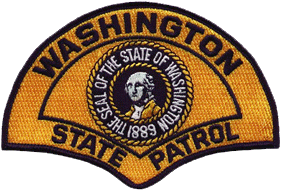
Washington State Patrol
June 8, 1921, was the date legislation authorized the appointment of highway police with the power of peace officers. The first six patrolmen were commissioned September 1, 1921.
In 1933, the Legislature acknowledged the need for a police organization that was mobile and could be concentrated immediately at any place in the state where the public safety was endangered.
The Highway Patrol Division officially became known as the Washington State Patrol, which had been given full police powers. However, the police powers were not to be used unless ordered by the Governor or requested by other law enforcement agencies. The State Patrol was placed directly under the Governor, who was authorized to appoint the Chief.
Motorcycles for patrol were on their way out that year, and light, fast automobiles of the panel delivery type, which could be used as a combination patrol car, mobile jail, and ambulance, were proving much more versatile for all-weather work than the motorcycle.
The Motor Vehicle Inspection Division and Weight Division, created in 1943, were responsible for checking trucks for size, weight, and license violations. Both divisions previously were under the Department of Highways. In 1949, the WSP began to trade away the "paddy wagons" in favor of four-door sedans, with improved police equipment and special engines, transmissions, and high-speed rear ends.
By the late 1950s, the Patrol began to phase in its current patrol car door design, a diagonal royal blue spear and black and white badge replica. By 1968, the WSP had converted all patrol vehicles to white.
In 1991,The WSP gained international recognition for its development of the Mobile Computer Network (MCN), an innovative system linking laptop computers in patrol cars with satellite and land-based radio communication technology.
The Washington State Patrol's primary focus has been to aggressively enforce its core mission to enforce driving under the influence (DUI) laws, speeding, aggressive driving, and seat belt laws throughout Washington.
As stated above, Prior to 1933, the Washington State Patrol was known as the Highway Patrol Division.
1924 provides the earliest glimpse of what cars of the Washington Highway Patrol were using for license plates at the time. The plates were randomly-numbered passenger car license plates, and in a 1924 photo, license number 83274 was assigned to the WHP, however no other markers or agency indicators were visible.
However in September of 2022, a staff member from the Washington State Patrol Headquarters reached out to hobbyist and this website's founder, Norm Ratcliffe with a query about what appeared to be a Washington Highway Patrol license plate of sorts that was nowhere in the agency's records.
A man from Vancouver Washington was renovating a 1906 home and during some excavation into the soil beneath a portion of the home that was extended in the 1930's, a 4 1/2 inch by 15 inch piece of embossed metal was pulled from the soft sand in remarkable condition. The piece of metal had four small round holes in each corner and two oblong slots about 2 inches in at the top from each side. An embossed line spanned the top and bottom length of the piece with the words HIGHWAY PATROL embossed and painted in yellow-orange.
This contrasted well with the black background.
The man, pleased with his find, brought it to the Washington State Patrol Headquarters and donated it for posterity.
It is not known if this plate was used on a motor car or fastened to the side car of a WHP motorcycle which would have been used at that time.
Either way, this superb discovery seen below was and still is the earliest identifier relic for a motor vehicle of the Washington Highway Patrol Division.
 Pre-1933 Washington Highway Patrol license plate.
Pre-1933 Washington Highway Patrol license plate.
Embossed steel.
Approx. 4 1/2" x 15"
Some passenger license plates were used by the WSP in the years from 1933 to 1937, with passenger number 200010 confirmed used by WHP in 1932.
Early tax exempt vehicles utilized the letter E on the license plates. This was for all levels of government (State, County and Municipal).
Although some local law enforcement agencies in Washington state used the exempt designated license plates for their patrol vehicles, none were confirmed for use on WSP vehicles until 1936.
A WSP panel van was photographed with State Exempt license plate # 601-354 affixed to the front.
It can be surmised that such State Exempt/Official Use Only license plates were used by the WSP from 1936 onward until proven otherwise.
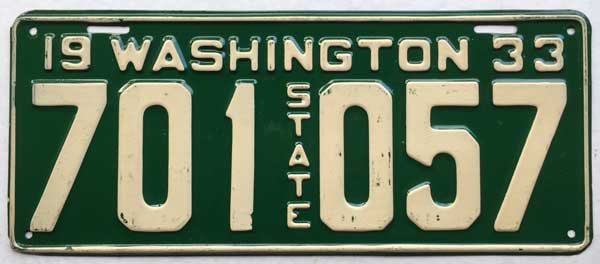 1933 State Exempt issue.
1933 State Exempt issue.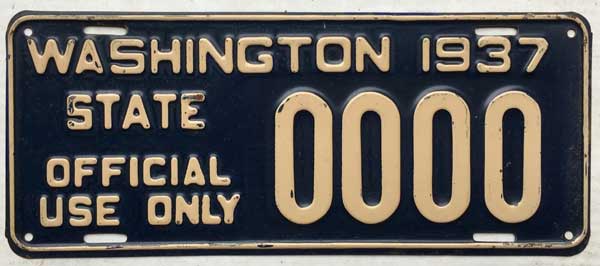 1937 State Exempt issue.
1937 State Exempt issue.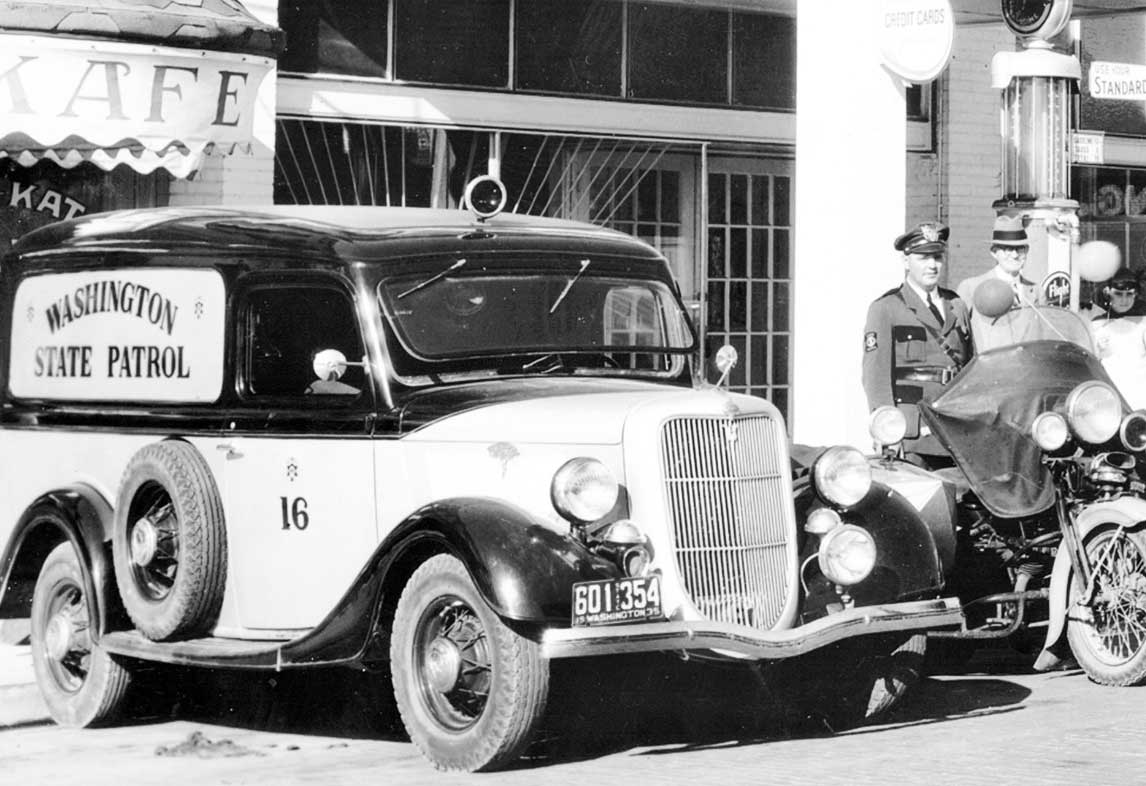 Earliest use of State Exempt license plates by WSP- 1936
Earliest use of State Exempt license plates by WSP- 1936 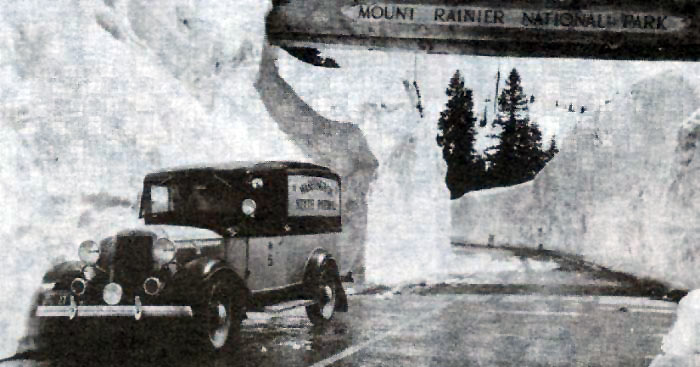
In 1937, a special State Official license plate was introduced for use on the vehicles of the Washington State Patrol. The plates were made of embossed steel and measured approximately 5 1/2" x 13 1/2". The plates were colored white over blue. WASHINGTON 1937 was embossed at the top of the plate. The left field of the plate had STATE over OFFICIAL over USE ONLY and then followed by an embossed assignment number up to three digits.
1938: 1938 WASHINGTON over STATE over OFFICIAL over USE ONLY followed by ###. 5 1/2" x 13 1/2". Green over white.
1939: 1889-GOLDEN JUBILEE-1939 over STATE over OFFICIAL over USE followed by #### over STATE OF WASHINGTON 5 1/2" x 13 1/2". Yellow over green.
As seen in the photo below, these 1939 STATE OFFICIAL USE license plates used by the WSP incorporated up to four numerals.
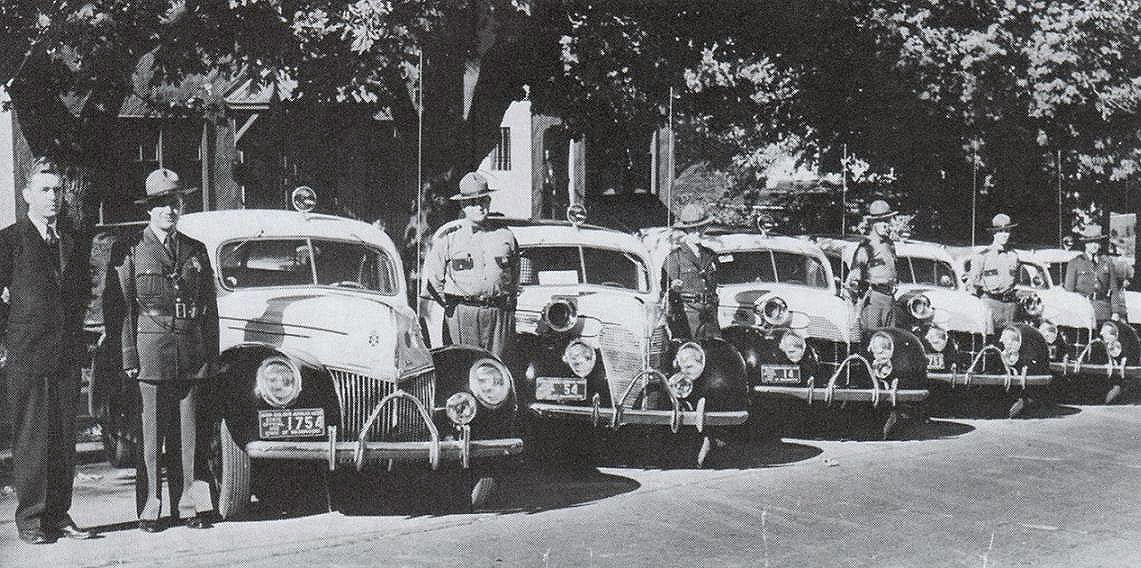
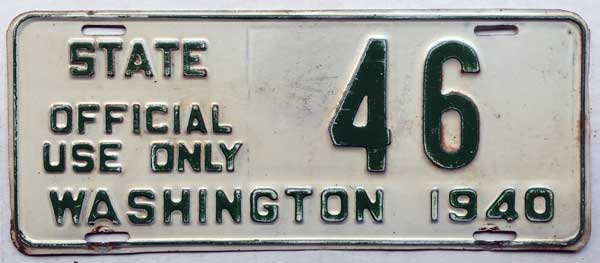 1940 issue. Embossed steel.
1940 issue. Embossed steel.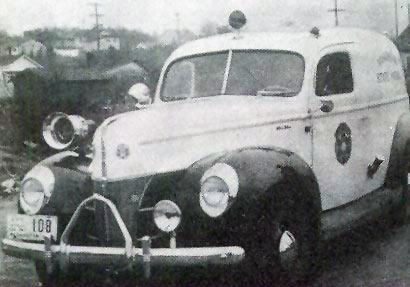
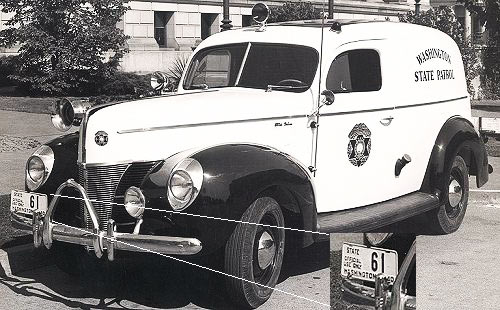
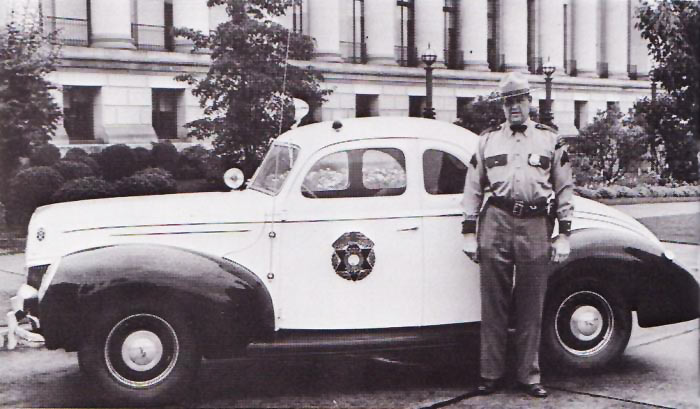
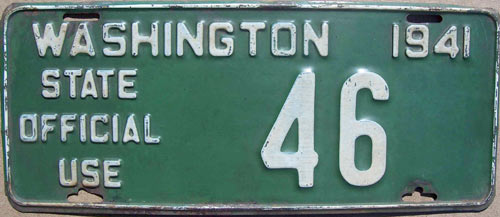 1941 issue. Embossed steel.
1941 issue. Embossed steel.
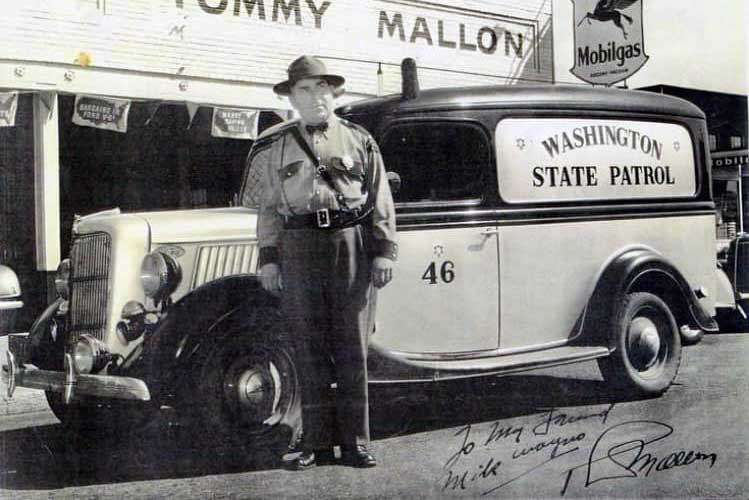 # 46 as seen above!
# 46 as seen above!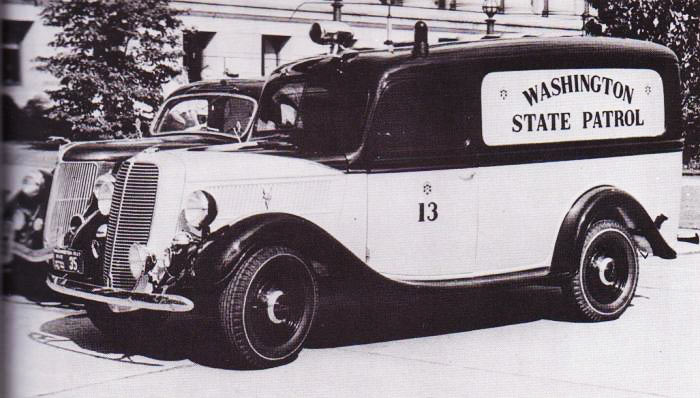
1942: STATE over OFFICIAL over USE followed by ### over WASHINGTON 1942 5 5/8" x 13 1/2". Green over white.
No license plates were issued in Washington State for 1943 and 1944 as an effort to conserve metal during World War II, therefore it was likely that WSP vehicles retained their 1942 license plates and validated annually by means of a windshield decal.
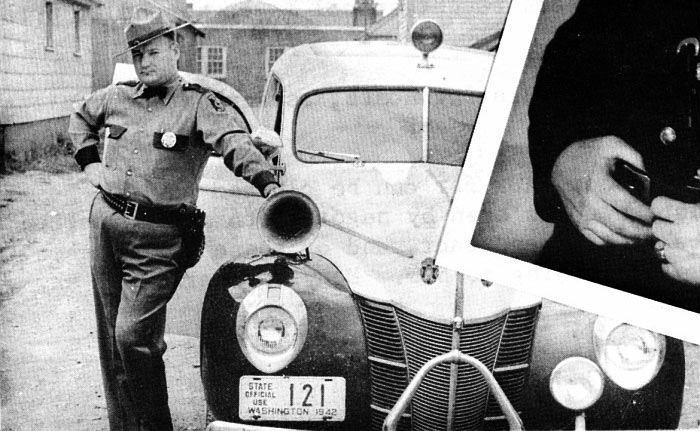
Although there is currently no documented proof, the STATE OFFICIAL USE license plates continued for 1945 on all marked vehicles of the Washington State Patrol. The WSP license plates for 1945 were made of embossed aluminum and measured 5 5/8" x 13 1/2". They were colored green over white and had WASHINGTON 1945 embossed along the top. The STATE OFFICIAL USE format would have likely followed the same format as the previous issues.
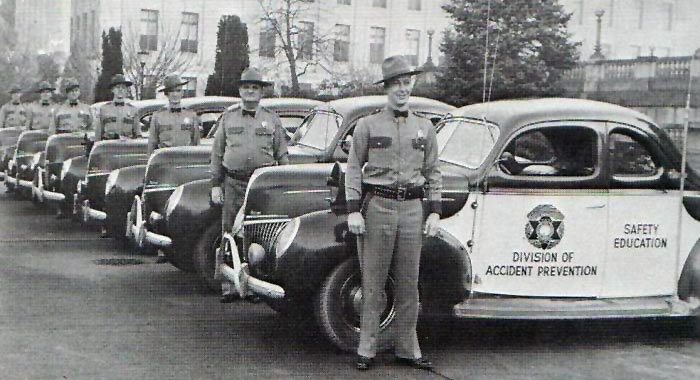
In 1946, State Exempt (SX) prefix license plates began to be used on marked Washington State Patrol vehicles.
The embossed aluminum license plates measured 5 5/8" x 13 1/2" and colored green over white. SX prefix followed by a number up to 3 digits. No dash or separator besides open space between the prefix and numbers. WASHINGTON 1946 embossed along the bottom.
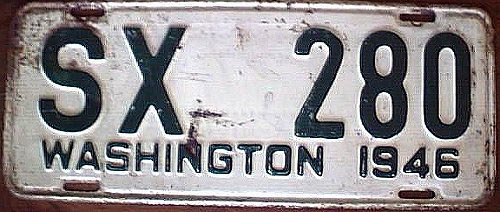 1946 State Exempt issue.
1946 State Exempt issue. 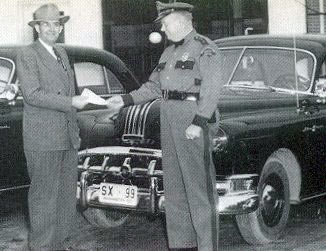
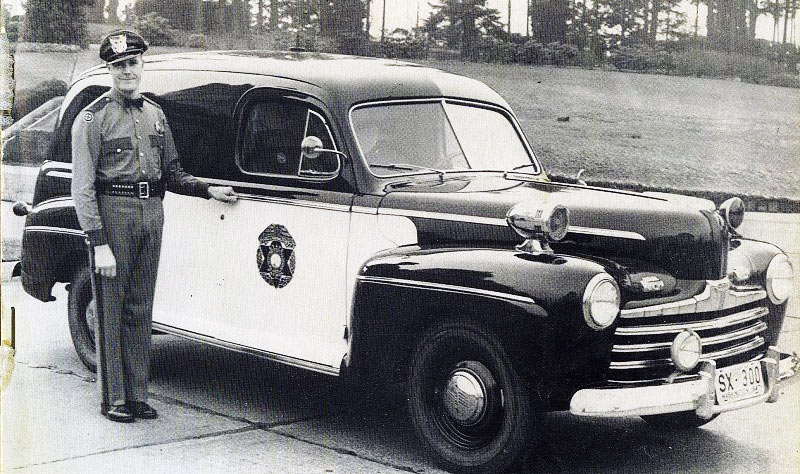
1947: SX- followed by ### over WASHINGTON 1947. 5 5/8" x 13 1/2". Green over shiny aluminum.
1948: Windshield decal used to re-validate 1947 license plate.
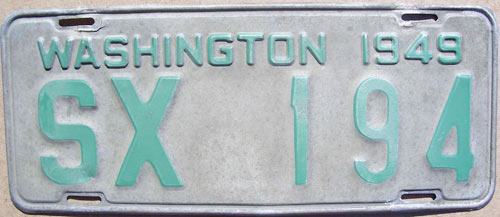 1949 State Exempt issue.
1949 State Exempt issue. 
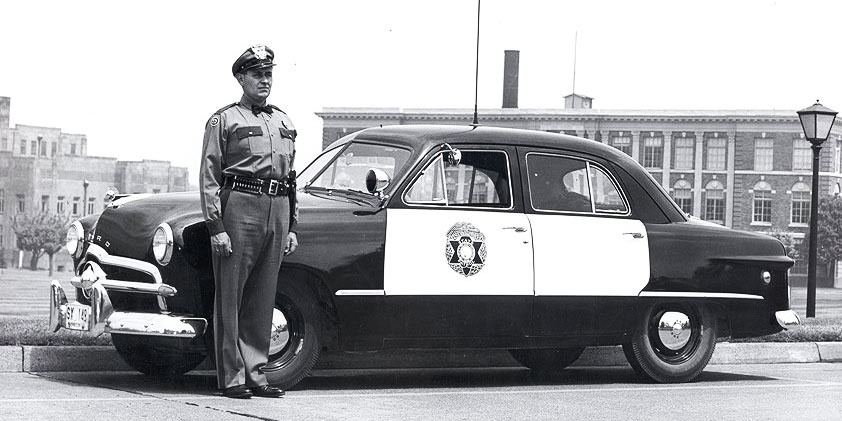
1950-1953: Embossed aluminum. SX- ### over WASHINGTON 50 (thin tab slots on either side of 50) 5 5/8" x 13 1/2". Green over white. Unknown if 1951 validation tab or 1952 windshield decal was used on state exempt vehicles.
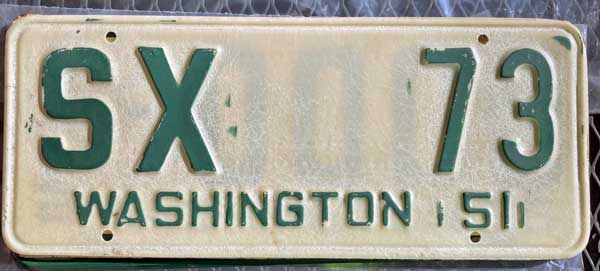 1951 issue
1951 issue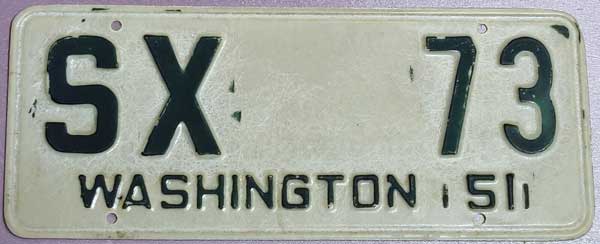 1951 issue
1951 issue 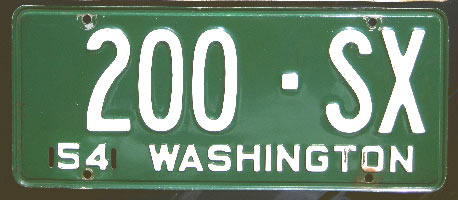 1954-1957 State Exempt issue. Embossed aluminum.
1954-1957 State Exempt issue. Embossed aluminum.
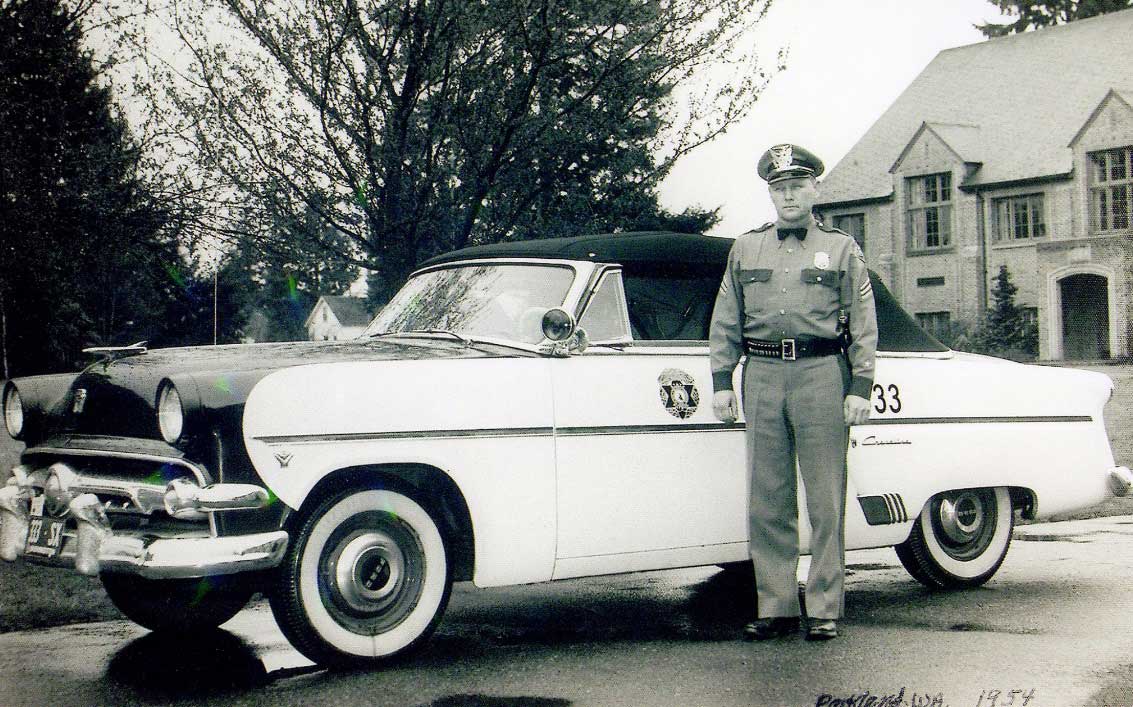 1954
1954
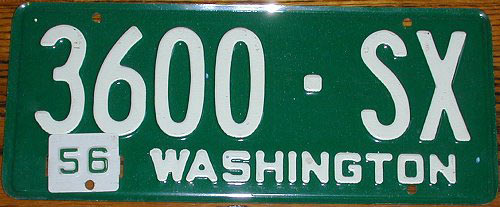 1954-1957 State Exempt issue. Embossed aluminum.
1954-1957 State Exempt issue. Embossed aluminum.
In 1956, the size-standardization to 6" x 12" for car license plates took place across all of North America. As a result, the 1954 Washington State Exempt layout and colors continued on the new 6" x 12" embossed aluminum license plates. Even the embossed 54 was still placed in the bottom left corner with tabs used for 1956 and 1957.
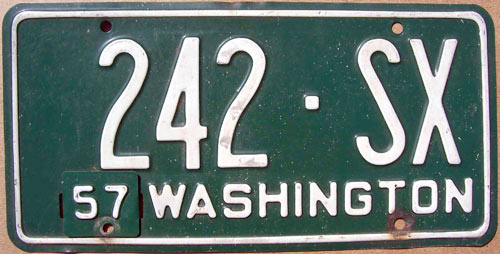 1956-1957 State Exempt issue. Embossed aluminum.
6" x 12" standard. White over green.
1956-1957 State Exempt issue. Embossed aluminum.
6" x 12" standard. White over green.
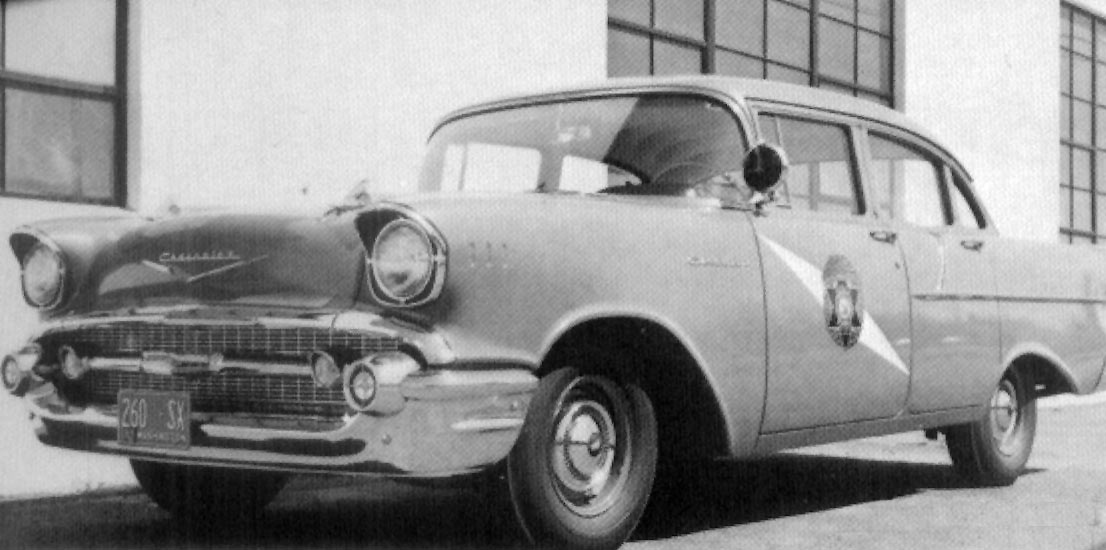
In 1958, a new state exempt license plate was introduced in Washington state. The plate was made of embossed aluminum and colored white over deep green. The letter S was used as a prefix to a three digit number which included lead zeroes for numbers under 100.
STATE X followed by a space and WASH was embossed along the bottom of the plate just above the mounting holes. The bottom right corner of the plate after WASH left enough room for a validation decal which began to be issued in 1959. The earlier versions had a period after WASH which was later dropped as it interefered with the positioning of validation decals. These license plates were used on marked Washington State Patrol vehicles until the end of 1962.
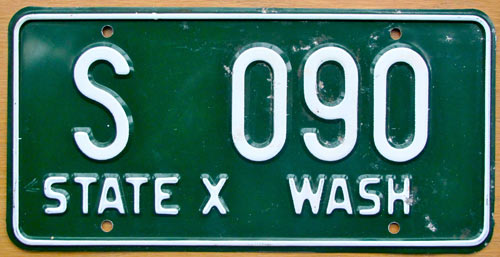 1958-1962 State Exempt issue. Embossed aluminum.
1958-1962 State Exempt issue. Embossed aluminum.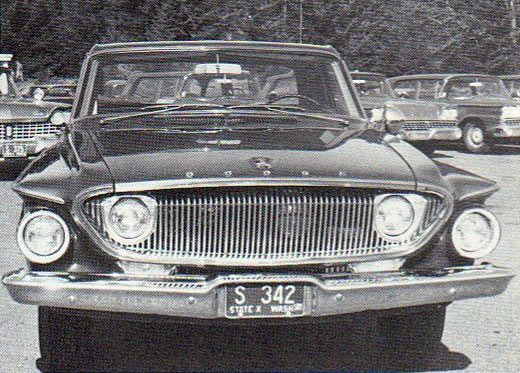
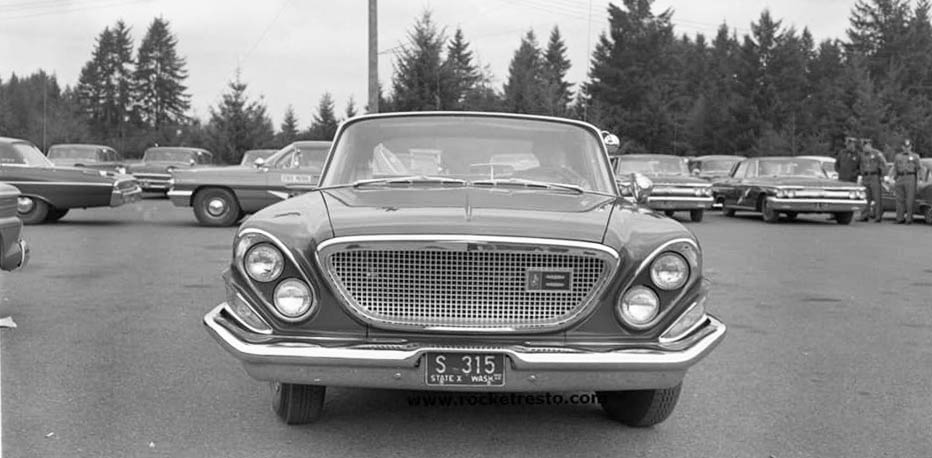
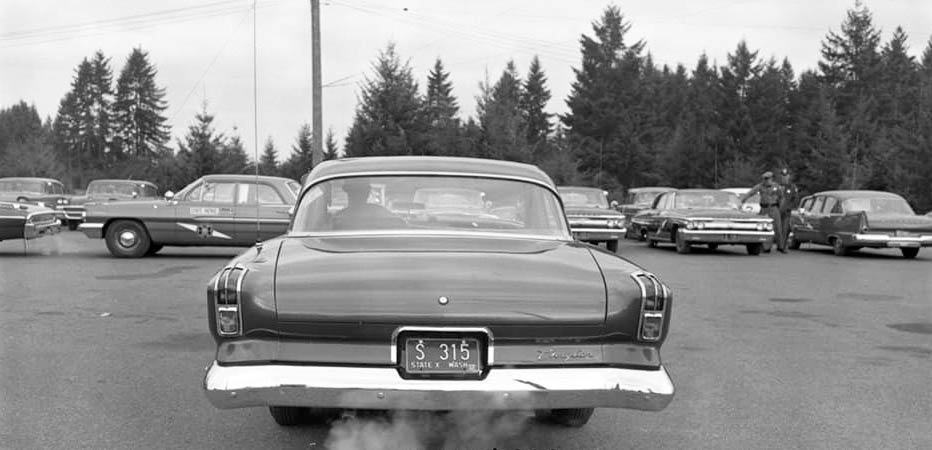 1962- Courtesy www.rocketresto.com
1962- Courtesy www.rocketresto.com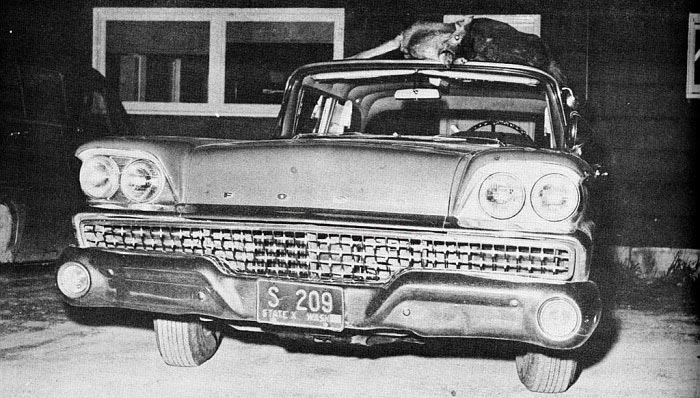
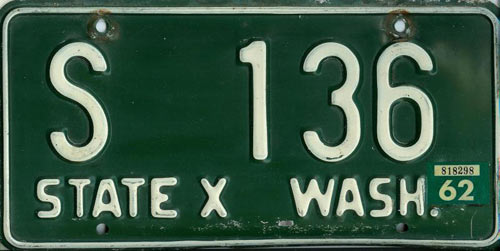 1958-1962 State Exempt issue. Embossed aluminum.
1958-1962 State Exempt issue. Embossed aluminum.
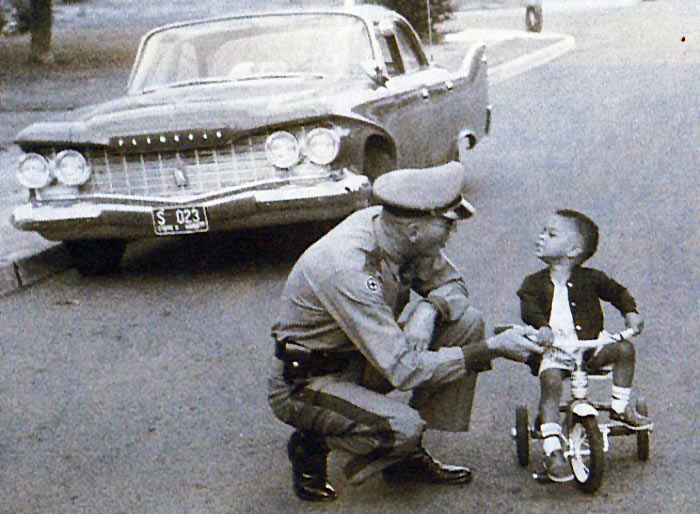
1963 saw the introduction of agency-specific license plates for exclusive use by the Washington State Patrol. The new embossed aluminum license plates followed the same format and coloring of green over white as the state's passenger car license plates, but had a prefix of WSP ahead of the 3 digit number. WASH. 63 was embossed at the bottom center of the plate just above the mounting holes.
These plates were validated annually by decals and used by the WSP until the end of 1967.
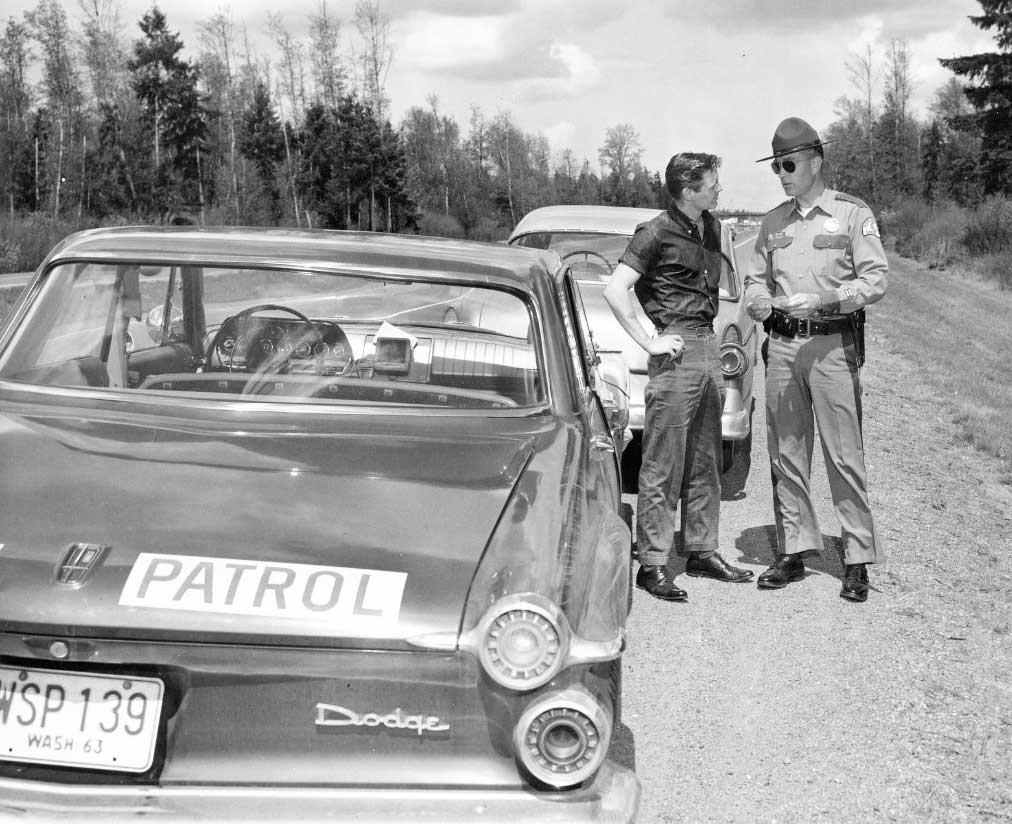 1963
1963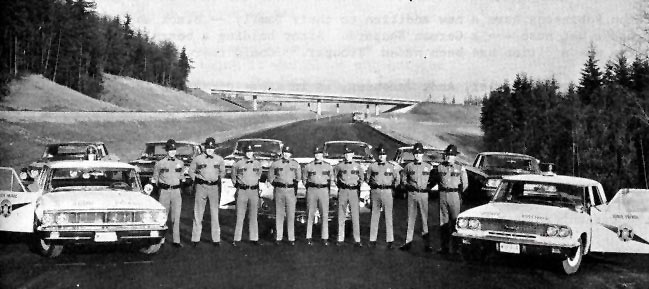
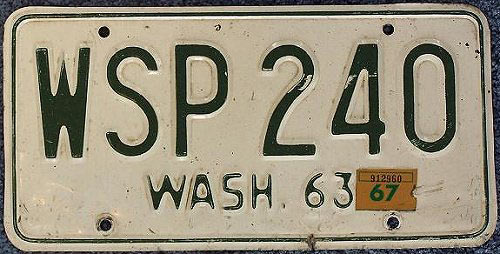 1963-1967 issue. Embossed aluminum.
1963-1967 issue. Embossed aluminum.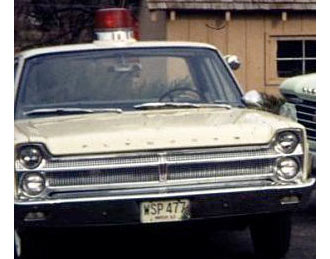
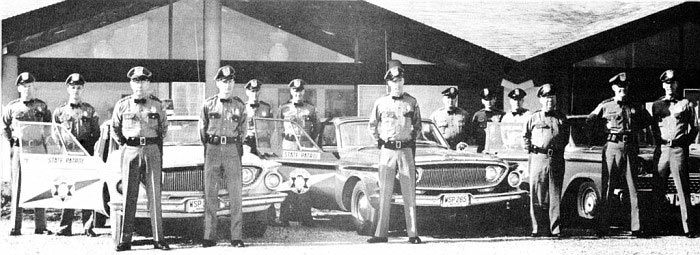
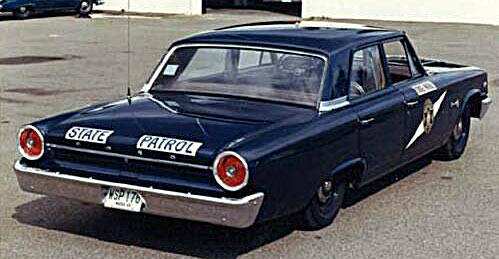
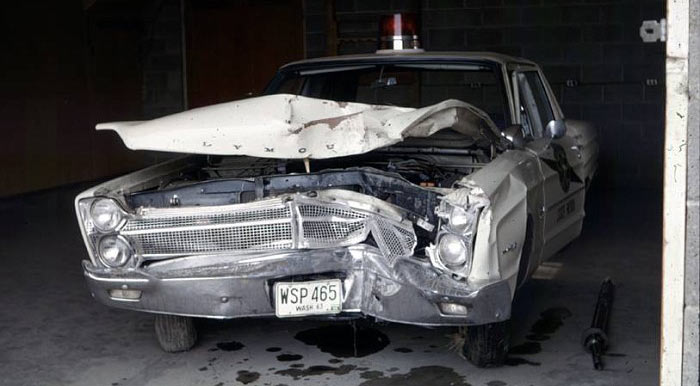 Courtesy www.rocketresto.com
Courtesy www.rocketresto.com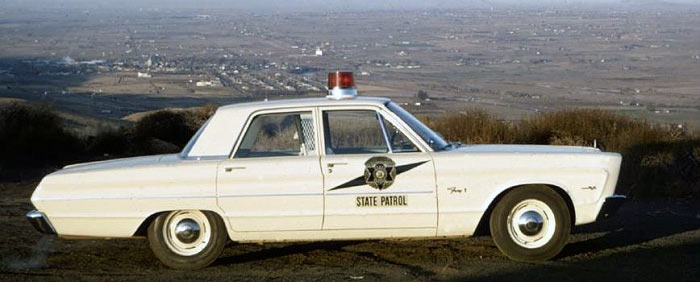
In 1965, a new base plate was issued for the Washington State Patrol, however it was only used as a replacement rather than for a fleetwide transition. The embossed aluminum plate was similar in color as the former 1963 issue and still used the WSP ### format. The only difference was the full spelling of WASHINGTON along the bottom center of the plate in lieu of WASH. 63. These plates were also issued through the end of 1967 and validated annually with decals placed in the bottom right corner of the plate.
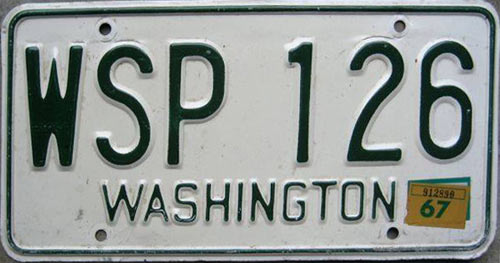 1965-1967 issue. Embossed aluminum.
1965-1967 issue. Embossed aluminum.
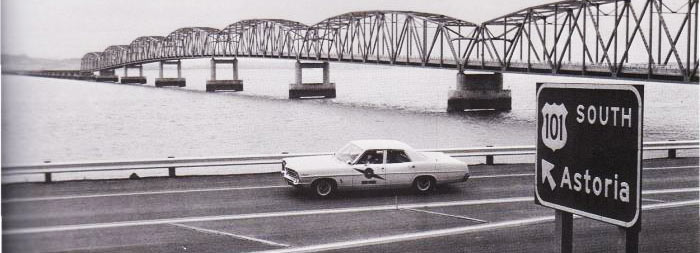
The Summer of 1968 saw the issuance of a brand new license plate for the Washington State Patrol. This was part of a general statewide "re-plate" for all motor vehicles in the state as a law that came into effect on June 1st of that year required all state license plates to be reflectorized. The license plates were still made of embossed aluminum and colored green over reflective white. The reflective material had a pigment that actually gave the background a shade closer to cream rather than pure white. WASHINGTON was embossed along the top left of the plate just below the upper left mounting hole. The state name was offset to the left to allow enough room for month and year validation decals for the upper right corner.
WSP prefix continued followed by a three digit number with lead zeroes under the number 100. This style of license plate was used by the WSP until 1979.
The earlier base plates can be identified by a "flat-topped A" in the state name and the flip-side painted in white. Later versions have a pointed-top A in the state name and the flip-side is bare aluminum.
From 1968 until 1975, these WSP license plates were often validated with annual decals. In 1976, these license plates were validated with white over green EXEMPT VEHICLE decals, However some WSP plates were seen with no decals at all.
WSP Command and Service Vehicles used similar license plates but with only an S prefix followed by a three digit number. These were used on Command Staff vehicles and on the 1965-1967 base, were also used on the WSP Scale Truck.
S 824 and S 827 were confirmed as used on WSP Command vehicles, however other numbers are possible as well. Some of these plates bore the green and white EXEMPT VEHICLE decal while others bore no decal at all.
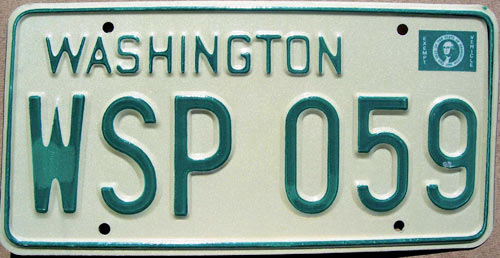 1968-1979 issue. Embossed aluminum.
1968-1979 issue. Embossed aluminum.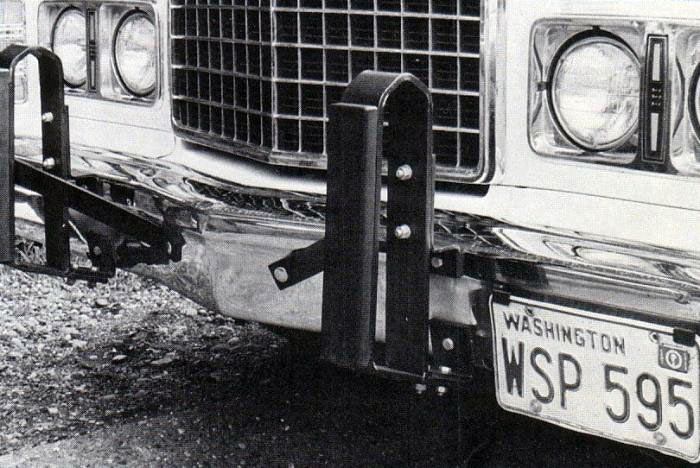
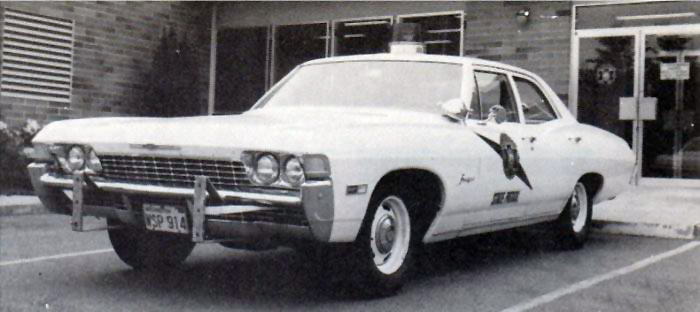
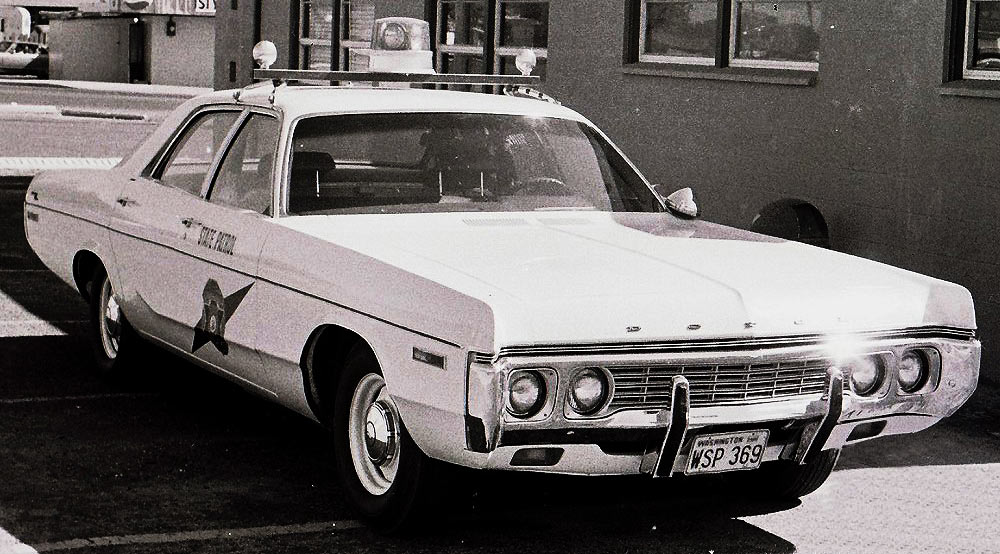
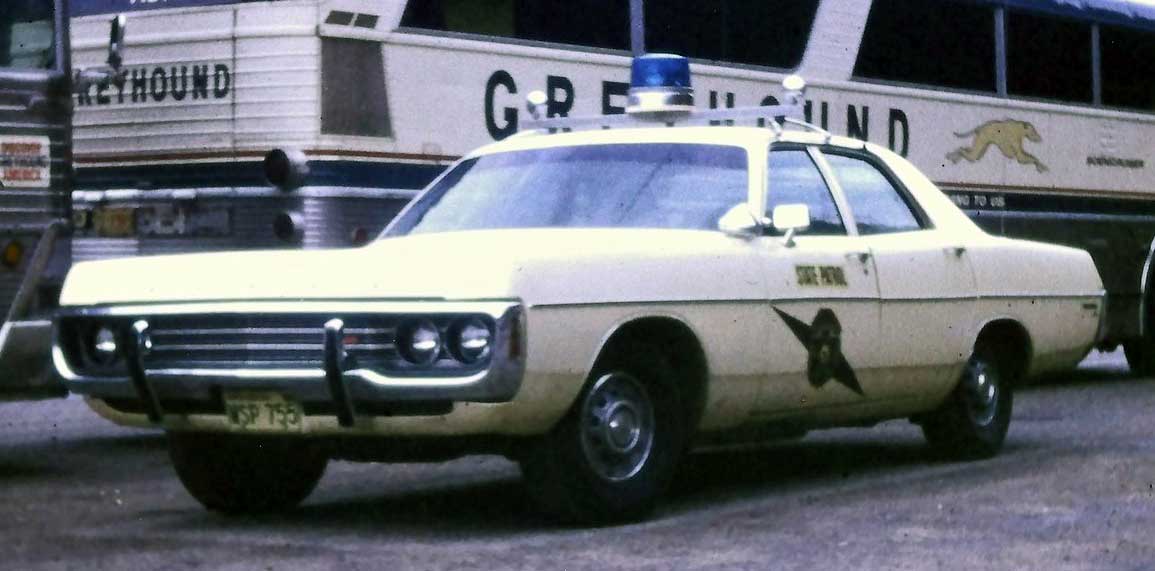 1971
1971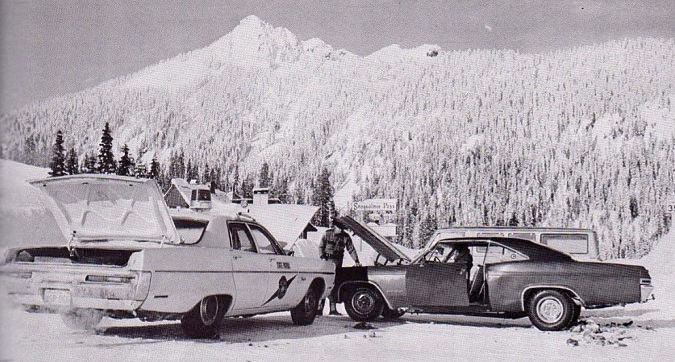
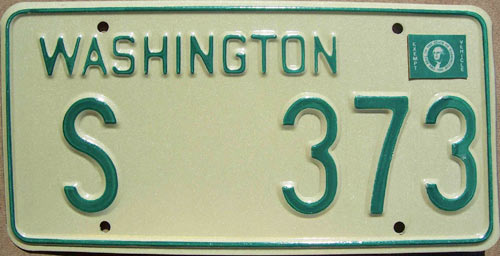 1968-1979 Command and Service issue. Embossed alumium.
1968-1979 Command and Service issue. Embossed alumium.
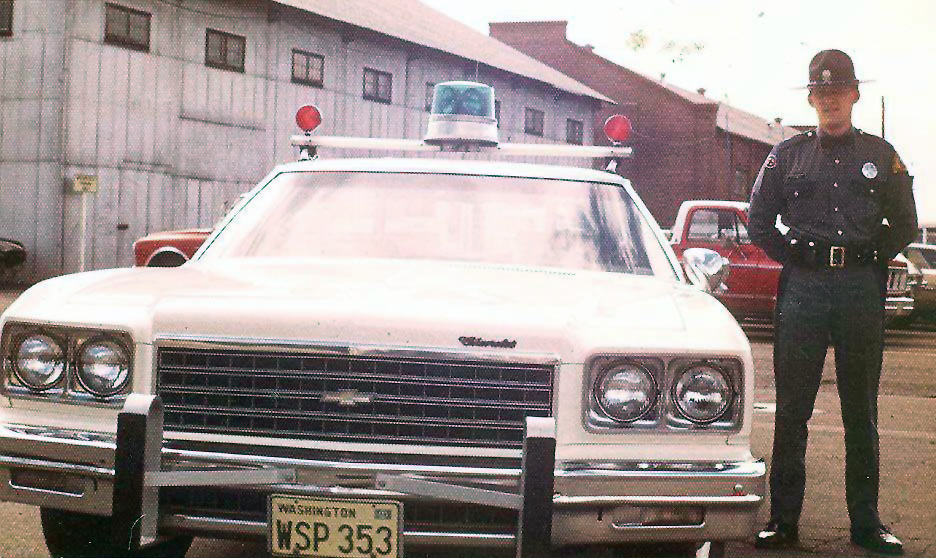
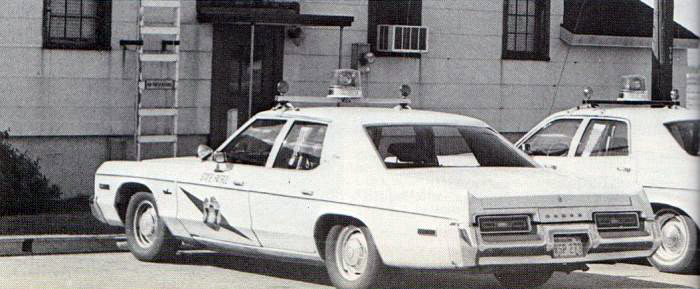
1979 introduced a new license plate for the Washington State Patrol. The embossed aluminum plates were still painted green over reflective white, however this reflective white background was much brighter than its predecessor. WASHINGTON EXEMPT was embossed along the top of the plate just below the upper mounting holes. The prefix used was SP for State Patrol and it was followed by a four digit number with lead zeroes for numbers under 1000.
Numbers were stated to be issued in seniority sequence, with lower numbers being assigned to the most senior members. The SP 7000 number bloc was reserved for WSP vehicles assigned to Weight Control Section (Commercial Vehicle Enforcement). License plates in the SP 9000 number bloc were reserved for pool vehicles not otherwise assigned.
These license plates were used by the WSP until 1987.
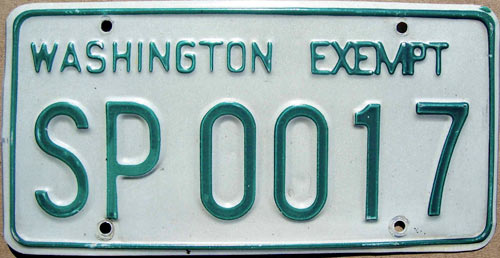 1979-1987 issue. Embossed aluminum.
1979-1987 issue. Embossed aluminum.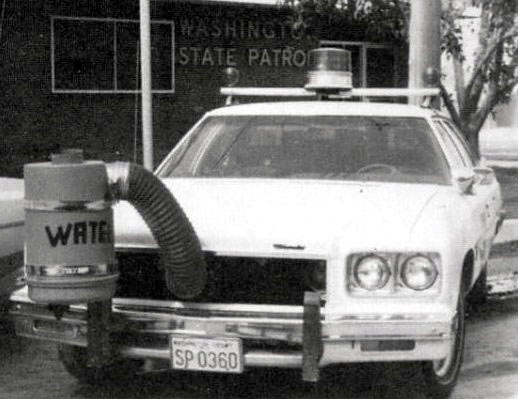
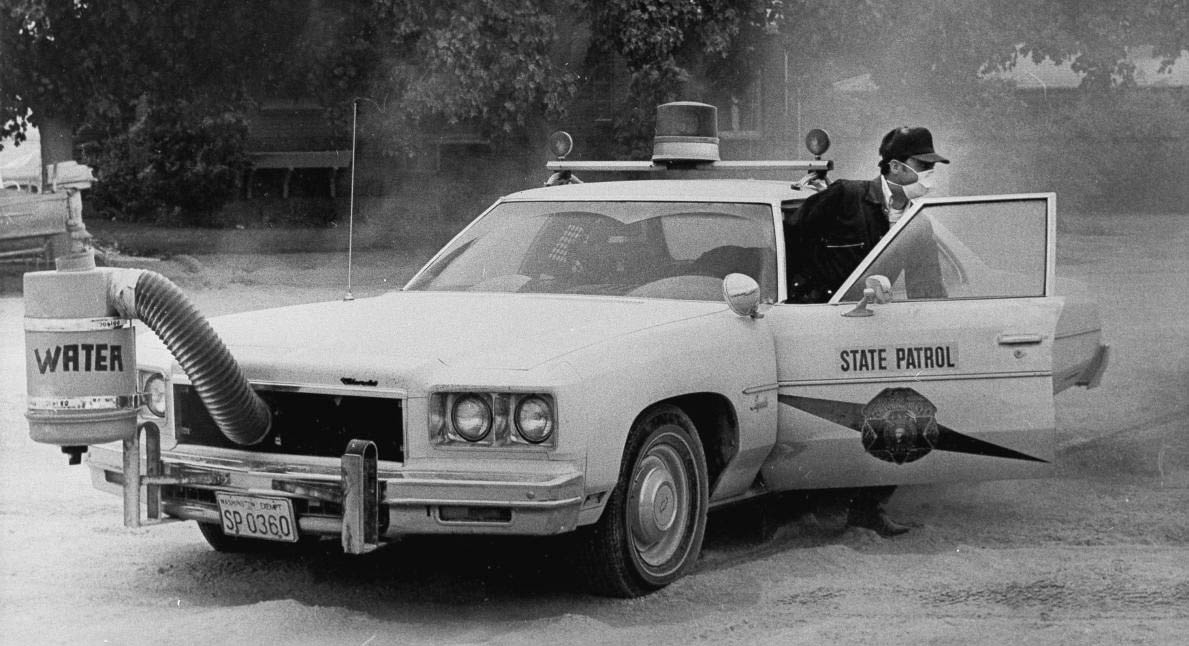 1980 during the eruption of Mount St. Helens. The fine ash in the air necessitated the use of auxiliary sources of water to keep the cars from overheating.
1980 during the eruption of Mount St. Helens. The fine ash in the air necessitated the use of auxiliary sources of water to keep the cars from overheating.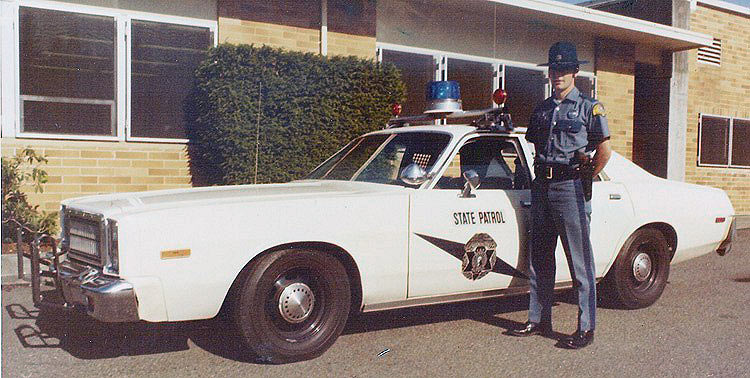
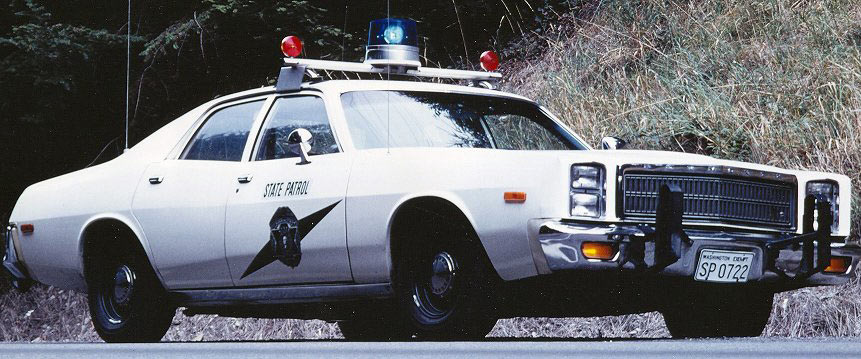
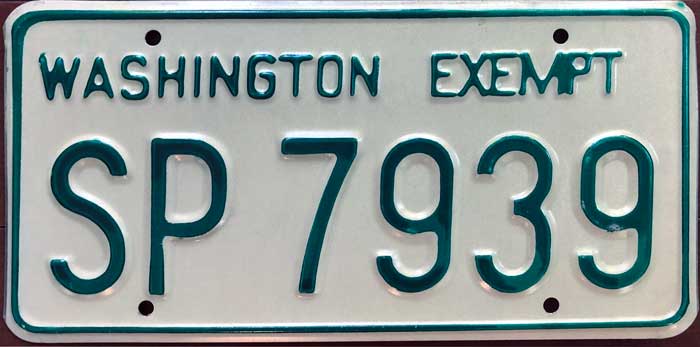 1979-1987 issue. Embossed aluminum.
1979-1987 issue. Embossed aluminum.
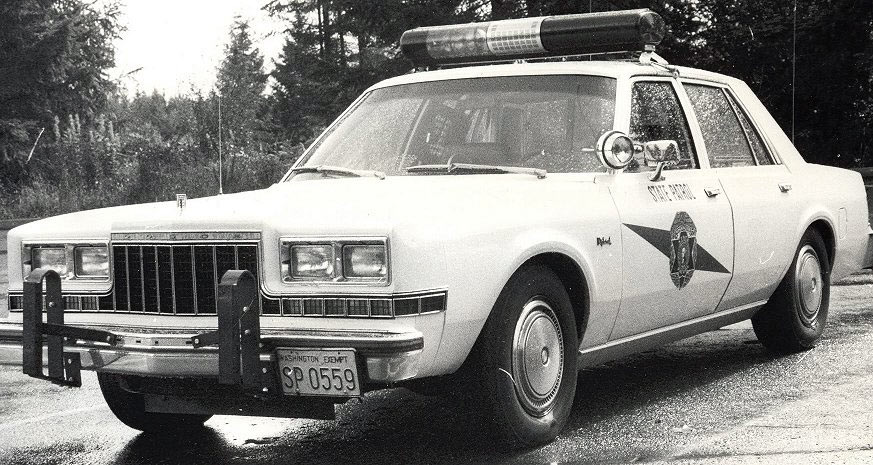
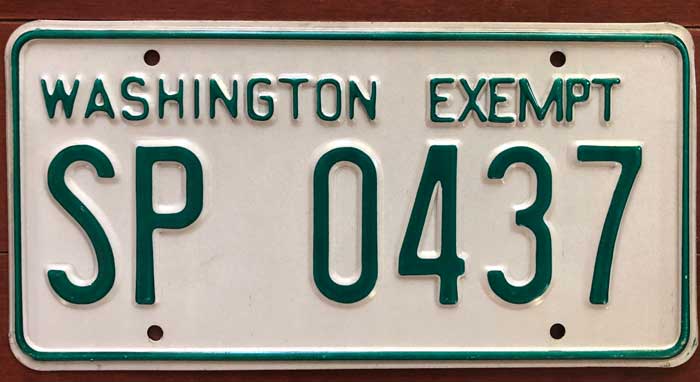 Mid 1985-1986 "Crossover" issue. Embossed aluminum
Mid 1985-1986 "Crossover" issue. Embossed aluminum
In 1986, the state of Washington was gearing-up for its 100th Anniversary of statehood celebrations which would take place in 1989. As part of the launch for this important milestone, license plates in Washington state would showcase attractive new graphic license plates to promote the state Centennial. The license plates of the State Patrol would follow suit.
The new embossed aluminum license plates were colored dark blue over a reflective white background accentuated by a silk-screened light blue rendition of Mount Rainier as the background. The state name was silkscreened in red in a stylized font between the upper mounting holes of the plate. Centennial Celebration was silkscreened in smaller stylized red font at the bottom center of the plate between the lower mounting holes. There was a light blue silkscreened square in the upper left corner of the plate inscribed with MONTH over TAB, which on WSP license plates, was left alone. The opposite top corner featured the white and green EXEMPT VEHICLE decal for some, but many others did not use the decal, so the light blue silkscreened square in the upper right corner was inscribed with YEAR over TAB would show.
The earlier versions of these license plates utilized the ###- WSP format for numbering. Some versions dropped the dash separating the numbers from the letters. Later versions for reasons still unknown felt the need to add the embossed stacked prefix of XMT down the left side margin of the plate in front of the first numeral of the assignment number. This caused a crowded look for when the assignment number went into four digits where the WSP suffix had to change to an SP suffix.
License plates on this base numbered 7- WSP through 10- WSP were assigned to Deputy Chiefs and HQ Majors. Plates numbered in the teens were assigned to District Majors. Plates in the 20's were assigned to Captains. Plates in the 30's through 100 were issued to Lieutenants. Plates from 101-WSP to approximately 250-WSP were assigned to Sergeants. Plates numbered 251-WSP and up were for commissioned personnel with Line Cars.
In 1991, the Centennial Celebration slogan was dropped, but the style, color and layout continued until the plates were replaced in 1998.
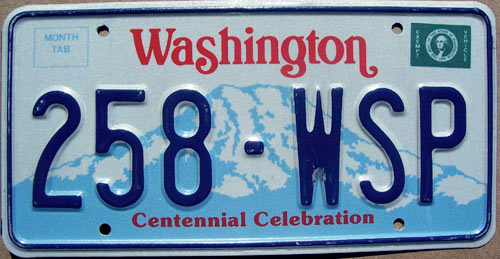 1987-1991 issue. Embossed aluminum.
1987-1991 issue. Embossed aluminum.
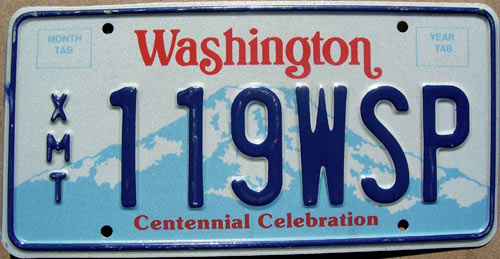 1987-1991 issue. Embossed aluminum.
1987-1991 issue. Embossed aluminum.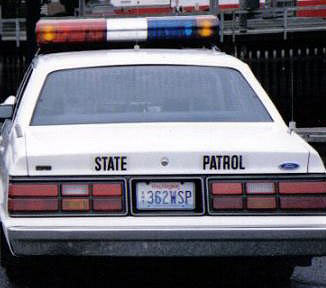
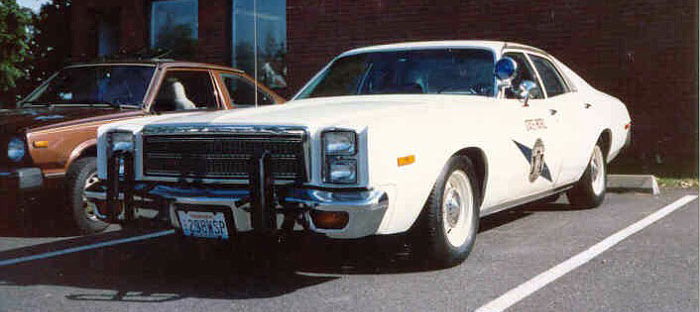
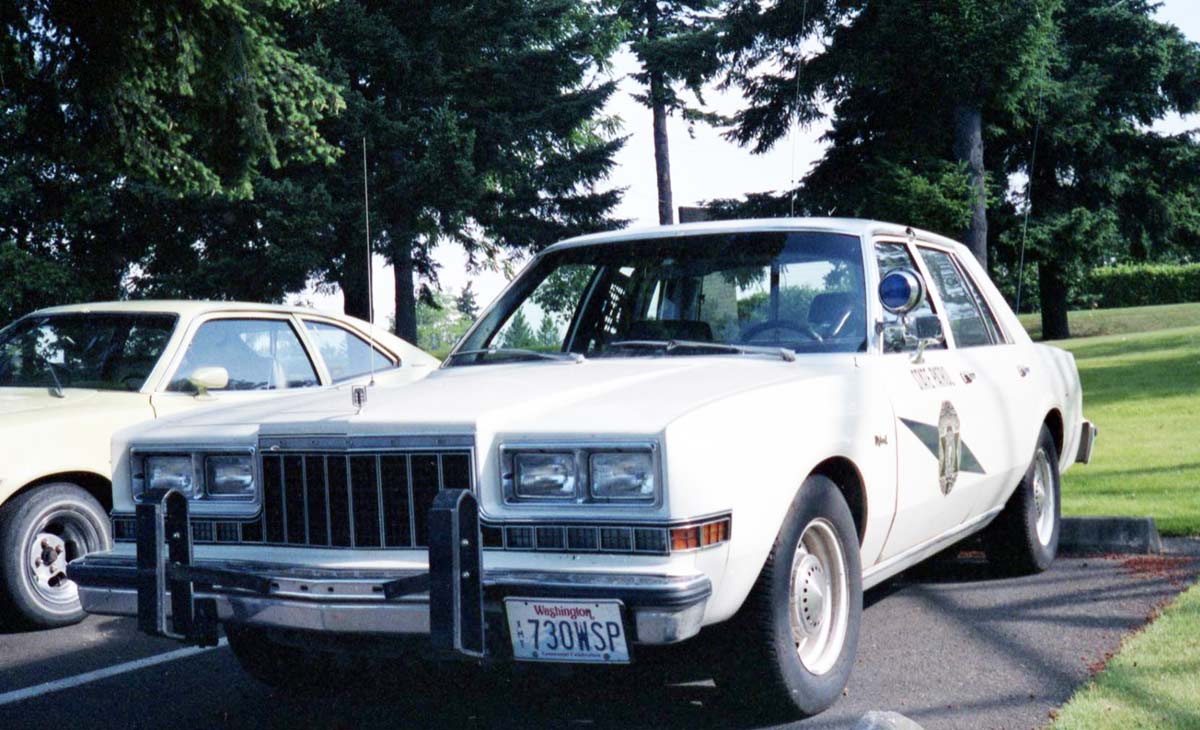
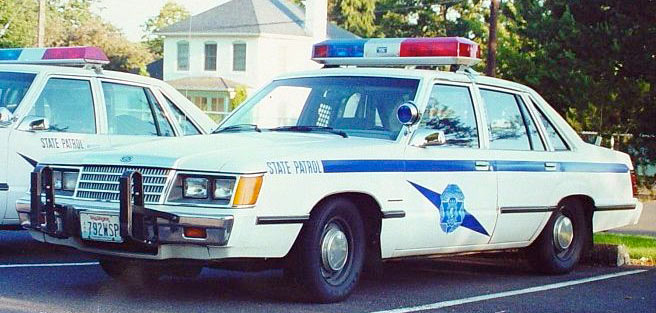
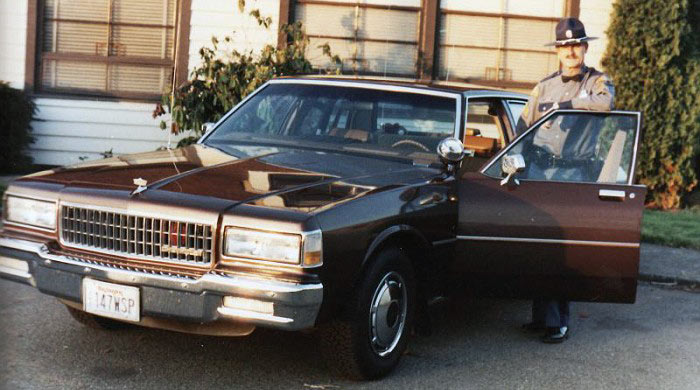
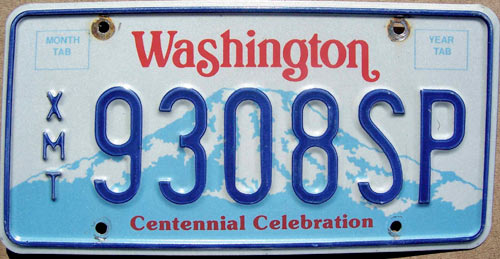 1987-1991 issue. Embossed aluminum.
1987-1991 issue. Embossed aluminum.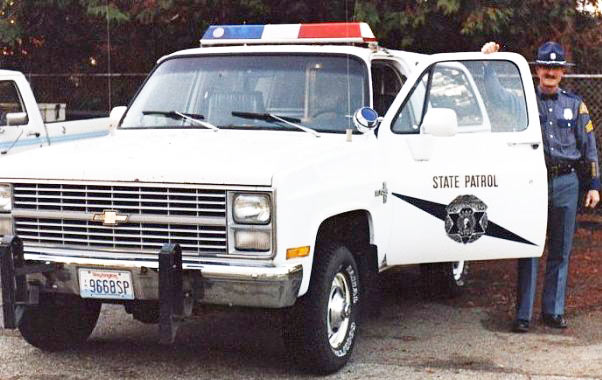 9000SP series- Pool vehicle.
9000SP series- Pool vehicle.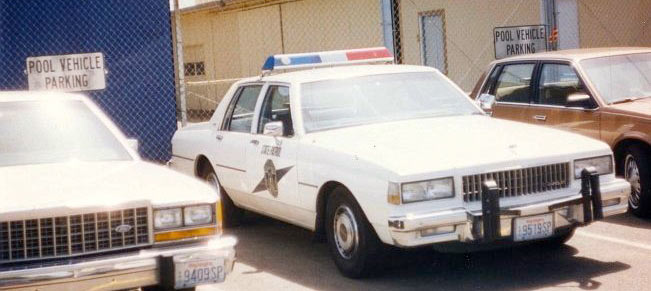
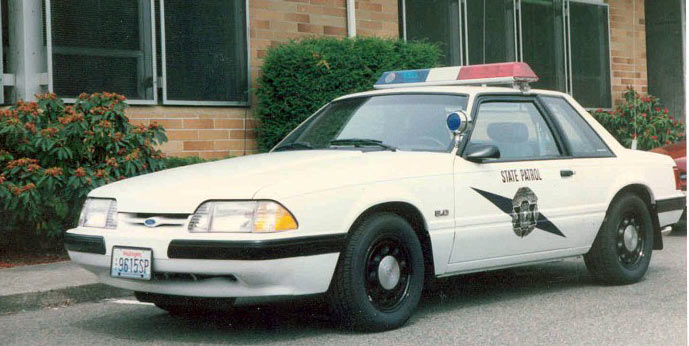
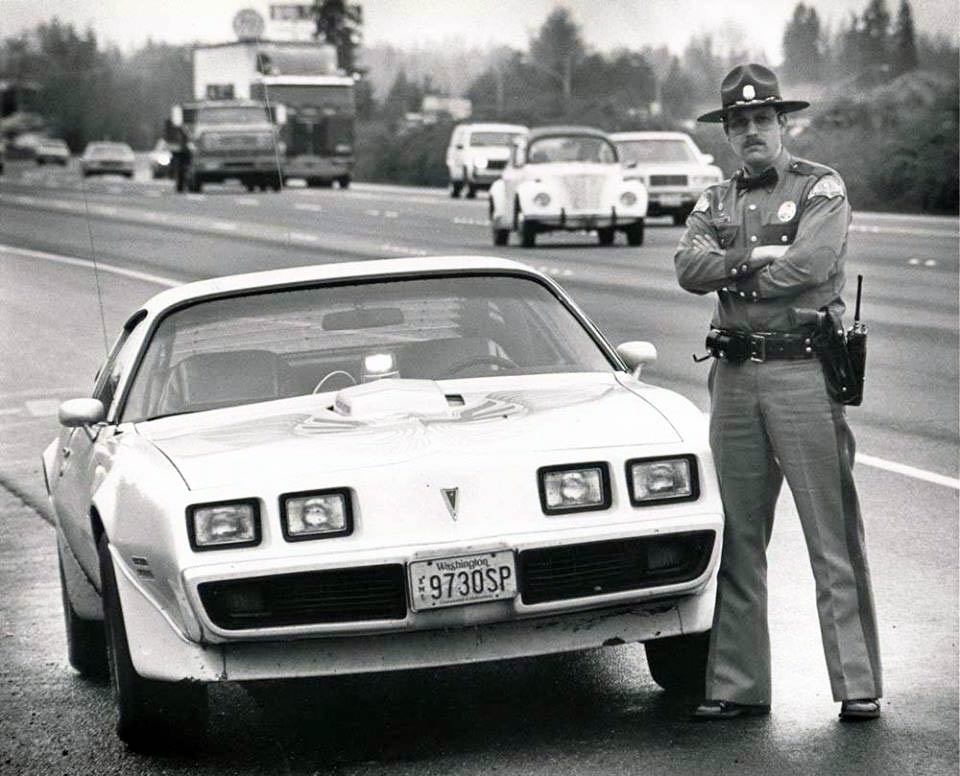 Arguably one of THE coolest trooper photos of all time: An unmarked Pontiac Firebird with a rotator dash light, the nothing-but-business moustache and aviator style glasses, the frown, the crossed arms, the cross-draw .357 revolver, all topped-off with a bow tie !
Arguably one of THE coolest trooper photos of all time: An unmarked Pontiac Firebird with a rotator dash light, the nothing-but-business moustache and aviator style glasses, the frown, the crossed arms, the cross-draw .357 revolver, all topped-off with a bow tie !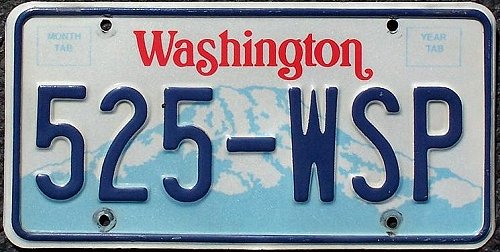 1991-1998 issue. Embossed aluminum.
1991-1998 issue. Embossed aluminum.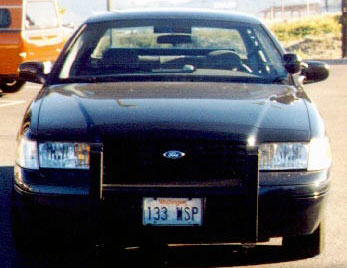
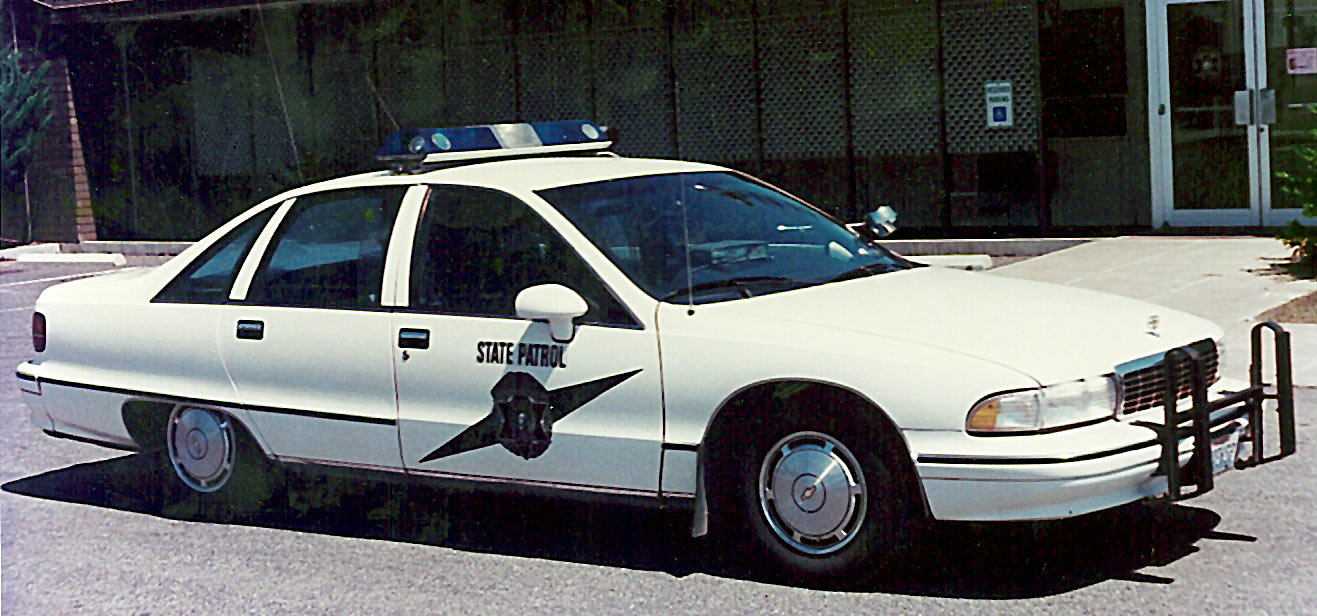
During 1994, an experimental "all-flat" (entirely silkscreened) license plate made by 3M was assigned to segments of the marked WSP fleet. They were made of flat aluminum and silkscreened in the same design and layout as the 1991-1998 issue, but with the assignment number and WSP suffix silkscreened as well.
The plates had the assignment number and WSP suffix centered in the middle of the plate with no dash or other separator.
The bottom center of the plate featured the word TROOPER or SERGEANT. No other ranks are known to have been used.
It is unknown how long the plates were used for before the testing by 3M came to an end and the plates were recalled for examination and destruction. Some troopers kept one of the two plates as a souvenir.
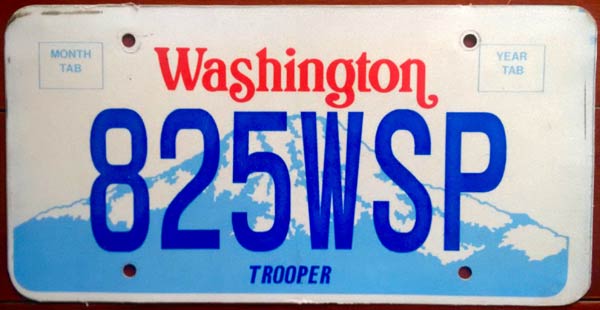 1994 3M Test plate. Silkscreened aluminum.
1994 3M Test plate. Silkscreened aluminum.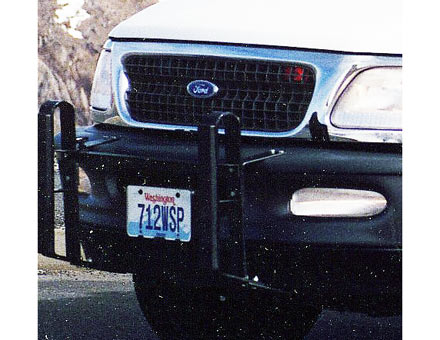
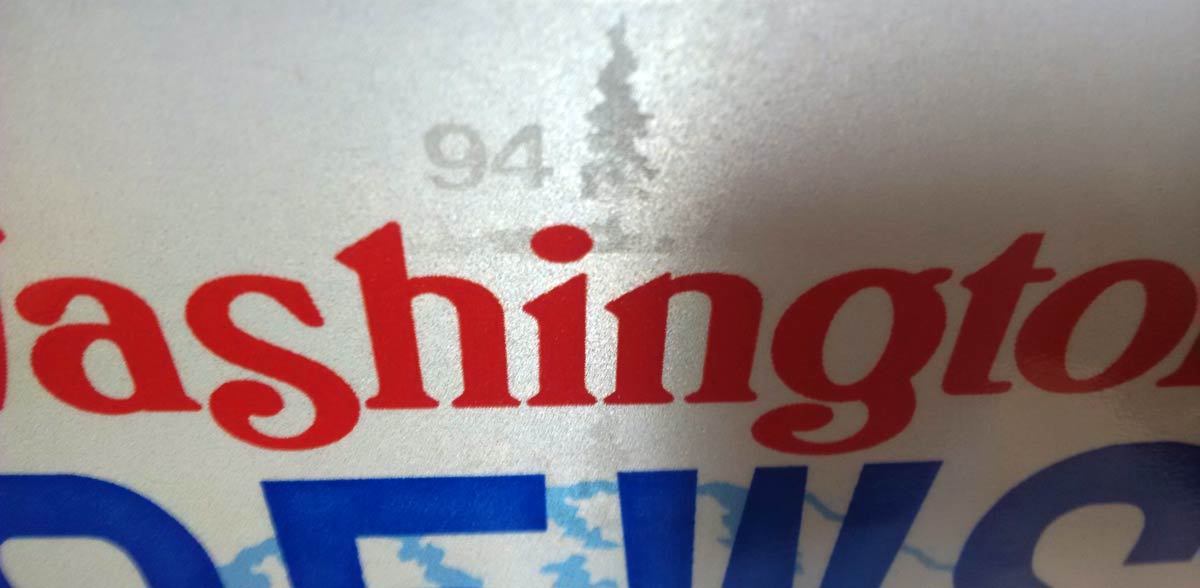 1994 hologram used on the 3M experimental test plate featuring fir tree.
1994 hologram used on the 3M experimental test plate featuring fir tree.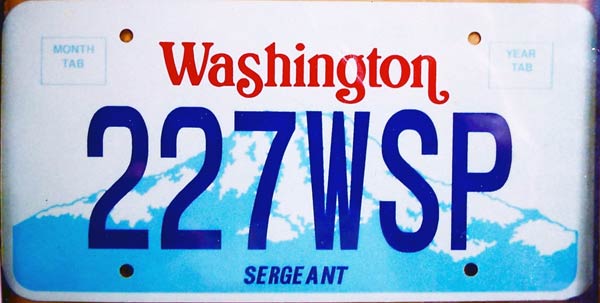 1994 3M test plate.
1994 3M test plate. 
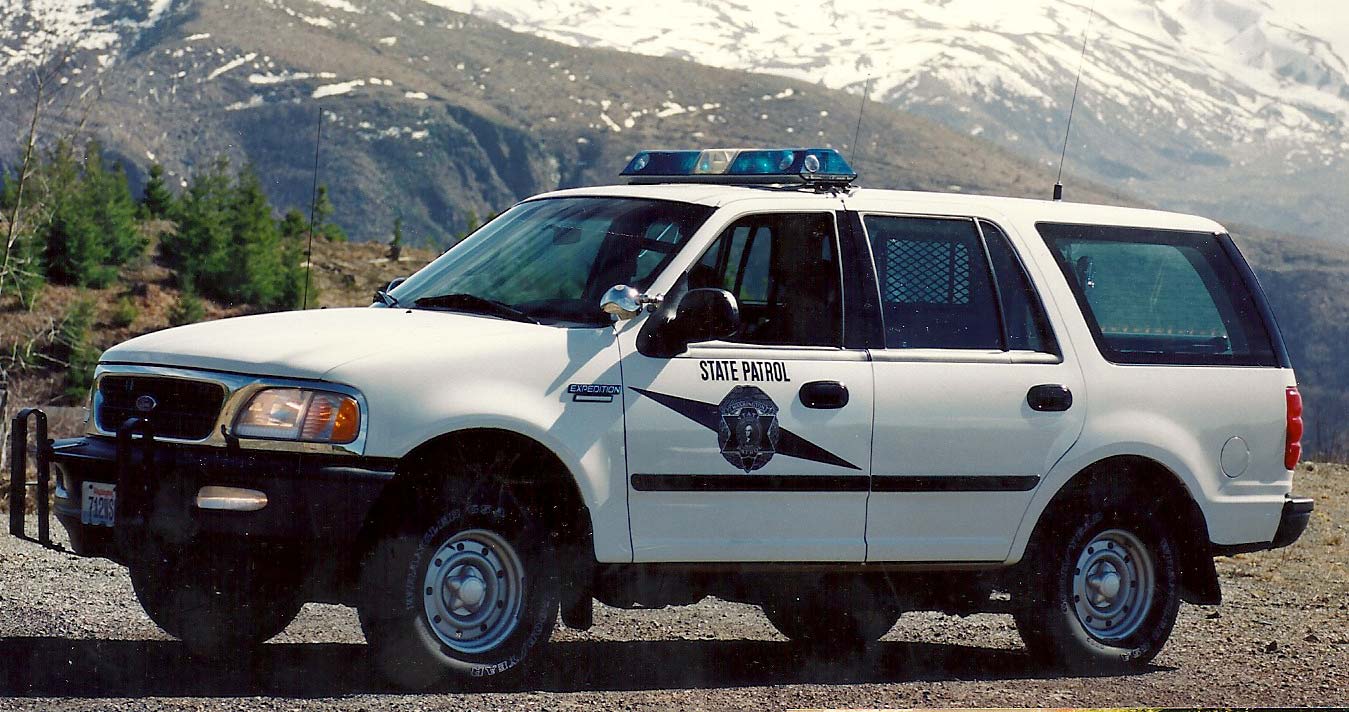
In 1998, the state of Washington launched a new license plate very similar to the popular Centennial Celebration design, It kept the same coloring and light blue background graphic of Mount Rainier as well as the numbering system with three numerals before a WSP suffix and four numerals before an SP suffix. The state name this time had a more conservatively-styled red font and was situated to the upper left side of the plate similar to the 1968-1979 series. This was to allow month and year decals to be placed side by side to the right of the state name on non-WSP license plates. The light blue silkscreened decal boxes with MONTH over TAB and YEAR over TAB occupied the space below the upper right mounting hole. The slogan EVERGREEN STATE was silkscreened in equally conservative red font at the bottom center of the plate. Also, for the first time, the embossed painted border was dropped in favor of a step border.
This style of license plate is currently still in use, however with silkscreened numerals. More recently a bar code has been added to the bottom right corner of the plate.
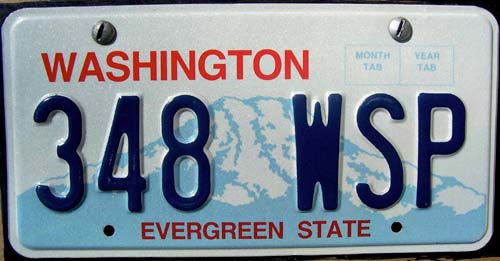 1998-Current issue. E
1998-Current issue. E

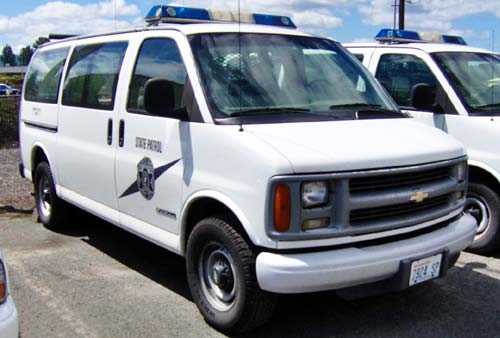 7000 series- Commercial Vehicle Enforcement
7000 series- Commercial Vehicle Enforcement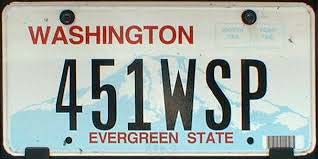 2010-Current issue. All silkscreened.
2010-Current issue. All silkscreened.
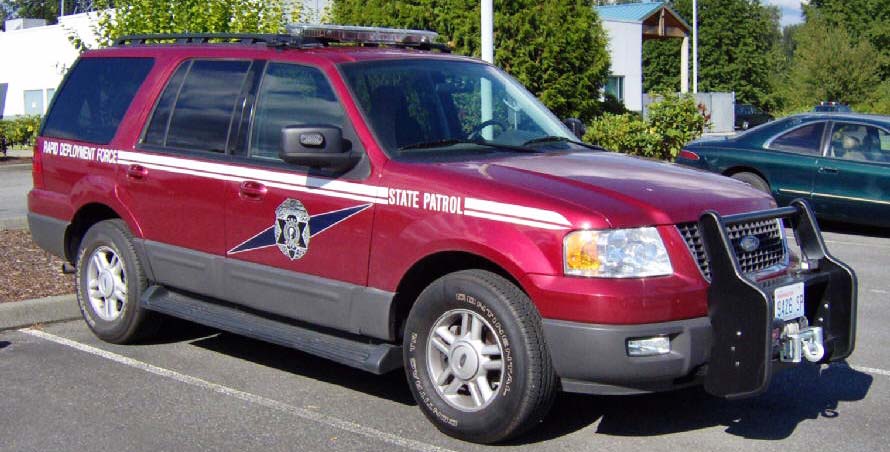
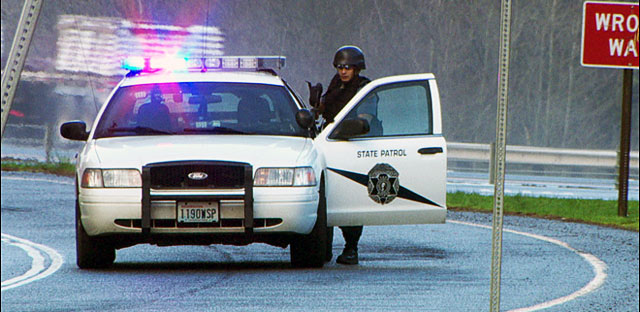
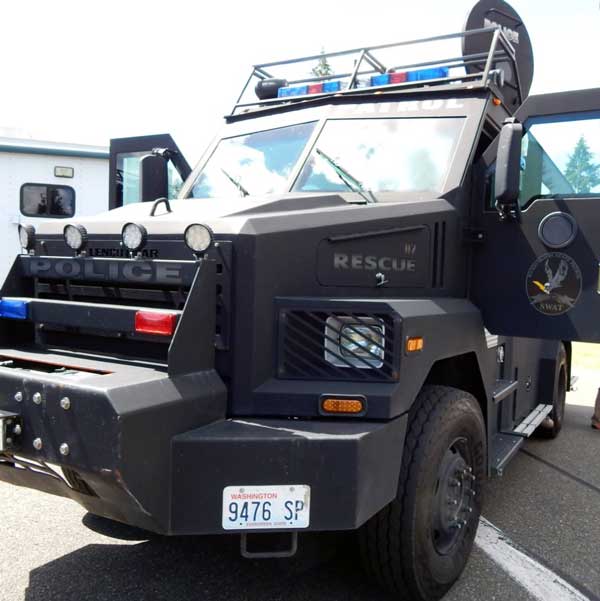 SP suffix in 9000 series.
SP suffix in 9000 series. 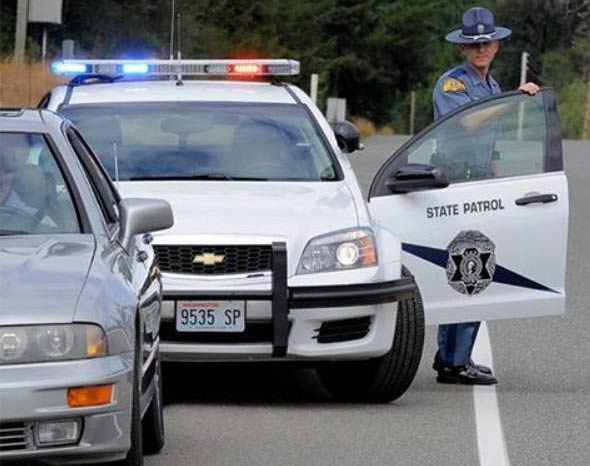 EVERGREEN STATE issue with SP suffix in 9000 series.
EVERGREEN STATE issue with SP suffix in 9000 series.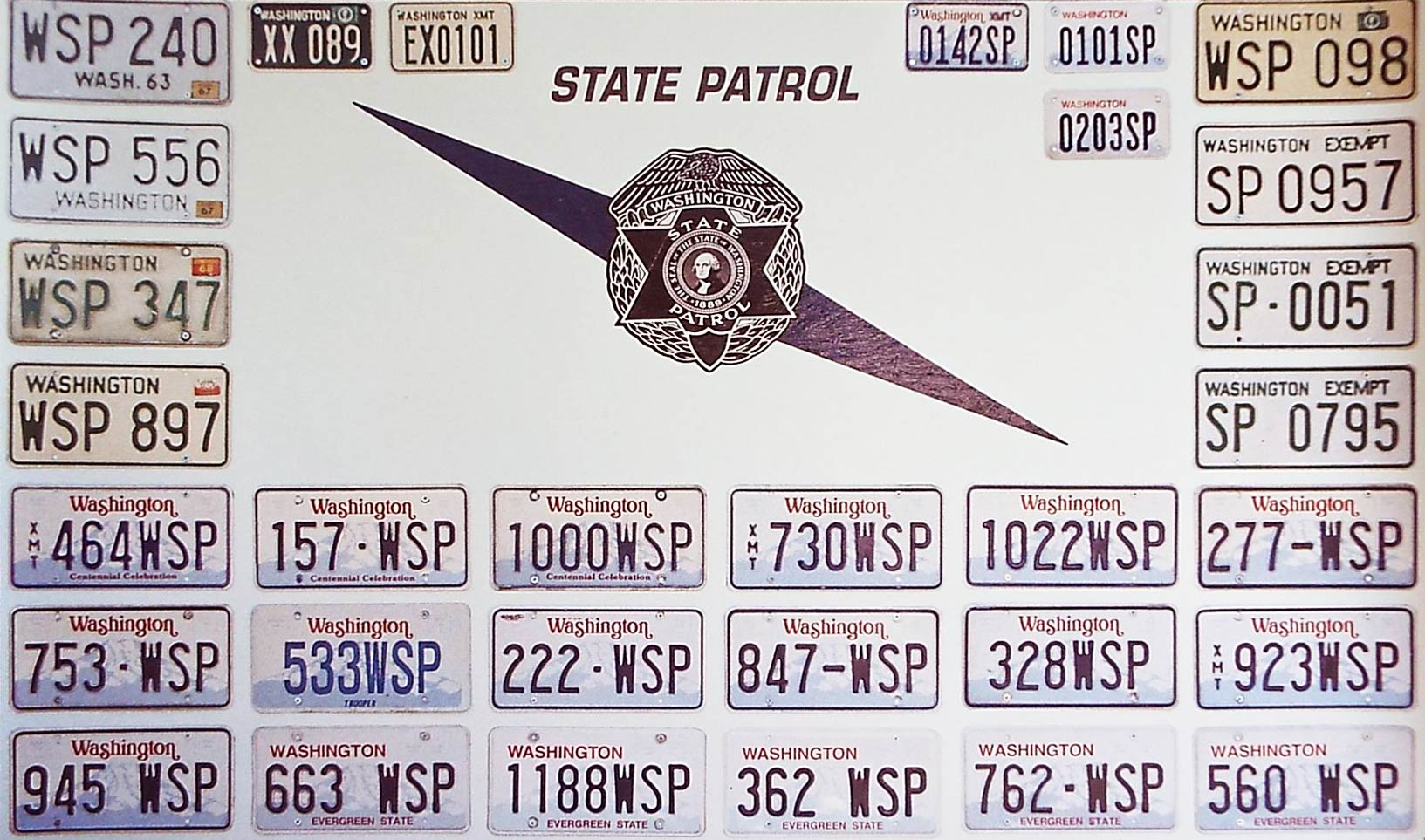 WSP license plate collection of Paul Petrinovich.
WSP license plate collection of Paul Petrinovich.On the 7th of April, 2016, the Chief of the Washington State Patrol announced that a new license plate would soon be gracing the front and rear of all marked WSP vehicles in the fleet with the exception of motorcycles. The plate would appear very similar to the existing style that had been around since 1998, however this new plate would have two very distinctive new features: The first being that the WSP characters and badge numbers of the new plate would be silkscreened instead of embossed. The second and most important feature being a new slogan at the bottom center of the plate: SERVICE WITH HUMILITY silkscreened in red just like the current state slogan.
There would also no longer be the unsightly Month Tab and Year Tab boxes in the top right corner anymore.
On May 1 2016, the new WSP "SERVICE WITH HUMILITY" had begun being issued to active WSP personnel for attachment to their marked vehicles. WSP troopers were permitted to keep their old EVERGREEN STATE plates should they so choose once the changeover took place, however returned plates were directed for destruction.
This re-plating affected over 1800 motor vehicles including motor pool, Fire Marshall, and Commercial Vehicle Enforcement. Badge numbers at the time of this event reached approximately 1240.
Seen below is the "pre-switch-over" from the old EVERGREEN STATE base plate to make way for the new SERVICE WITH HUMILITY plate for badge #87, May of 2016.
Photo and information courtesy of Paul Petrinovich.
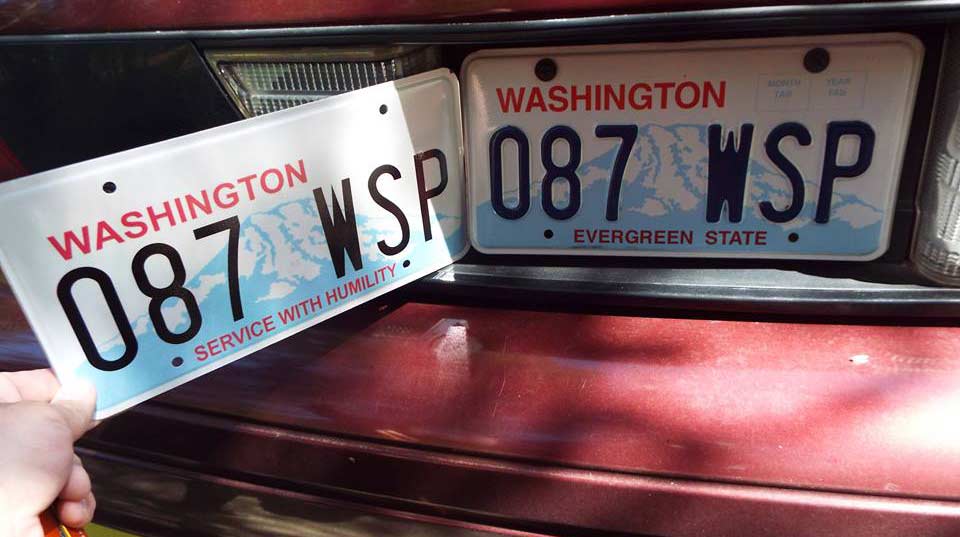
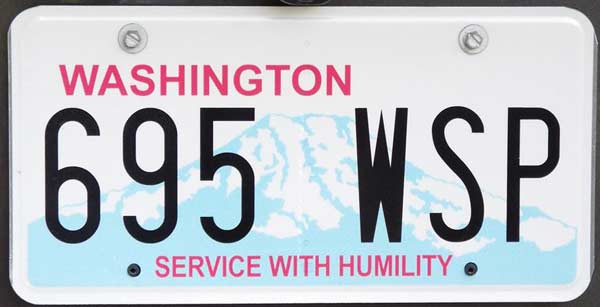 May 2016-Current issue.
May 2016-Current issue. 
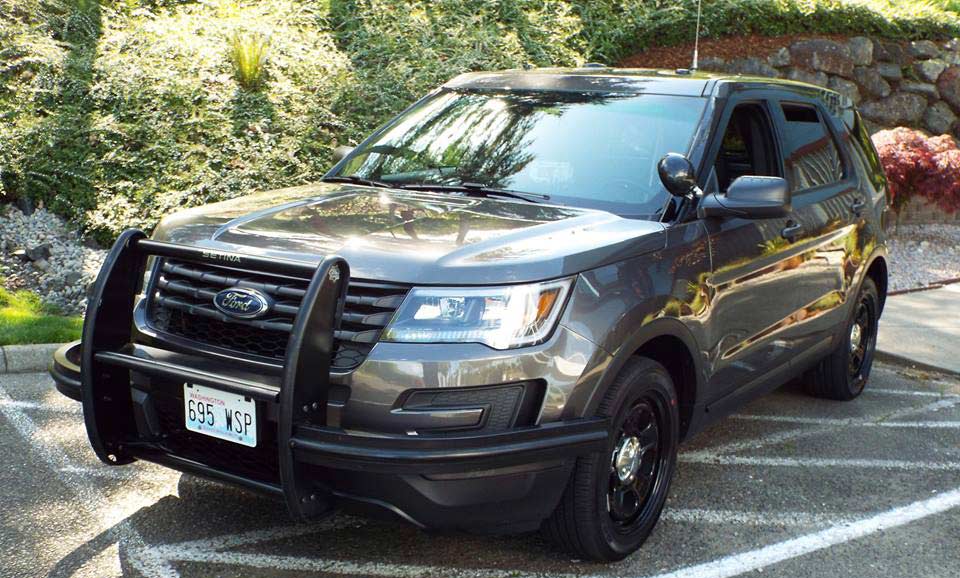 (Courtesy Paul Petrinovich)
(Courtesy Paul Petrinovich)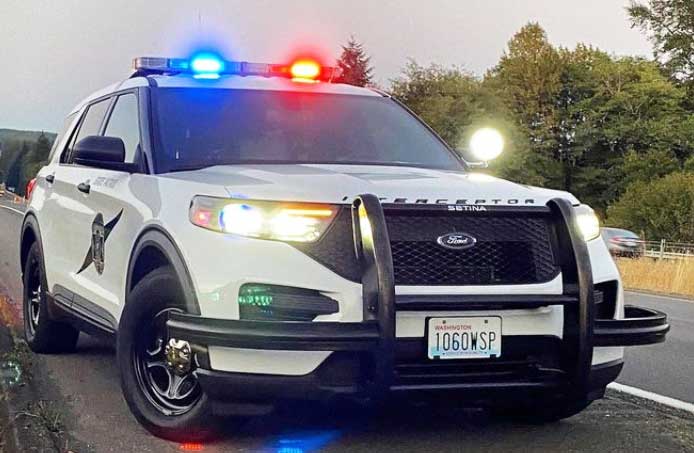 (Courtesy Jim Aitken)
(Courtesy Jim Aitken)The earliest record of motorcycle use by the Washington State Patrol is from 1922 with the photo of the three WSP riders seen below. The license plate used is a standard Washington state motorcycle plate number 6606 and 6607. The plate would have been made of embossed steel and measured 4" x 7". The colors were white over brown. The abbreviation W N (with an underscore below the N) was embossed over E-22 followed by the number.
By 1923, license plates used on Washington State Patrol motorcycles were using Exempt prefixes in the 8000 number series. The same WN prefix continued but this time embossed over the letter E followed by a colon and the last two digits of the year.
The 8000 series Exempt motorcycle license plates for WSP continued well into the late 1930's, however the information stops there until the 1987 graphic plates came out.
It is not known if motorcycle use for patrol was discontinued for a long period as it had with other state agencies around the nation or if it's just an information gap.
The 1987-1998 Mount Rainier graphic motorcycle license plates were made of embossed aluminum and colored dark blue over reflective white. The light blue silkscreened image of Mount Rainier occupied the background and the same stylized red font as used on the larger plates for the state name was used on the motorcycle plates and positioned off to the upper left portion of the plate. XMT (Exempt) was embossed in dark blue to the right of the state name. A four digit number with a lead zero was embossed with an SP suffix. Most numbers are in the 0100SP series.
The 1998-Current WSP motorcycle license plates followed the same format and coloring, however the painted embossed border was dropped in favor of a step border, and the embossed XMT was also eliminated. The state name was silkscreened in red on the upper left side in a more conservative-style font.
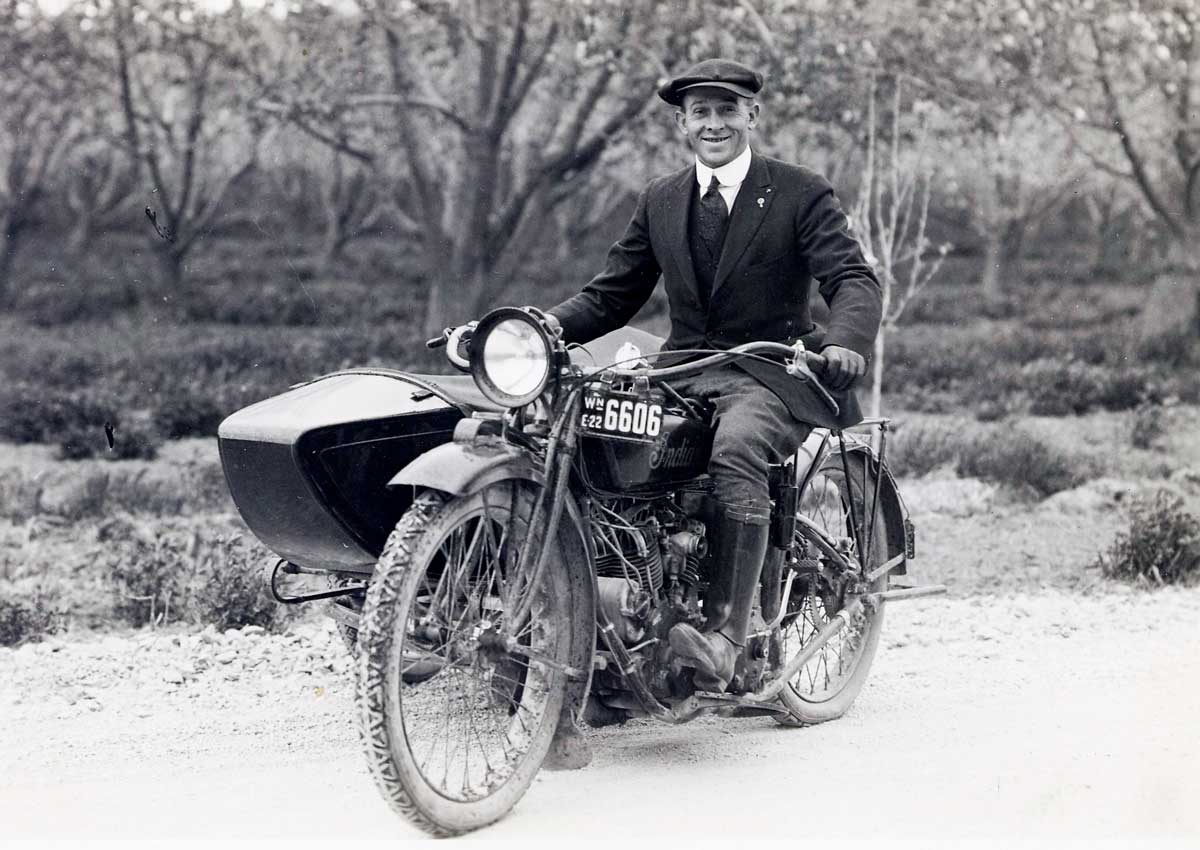 1922- WSP motorcycle plates were issued in 6600 series as also seen below far left (6607).
1922- WSP motorcycle plates were issued in 6600 series as also seen below far left (6607).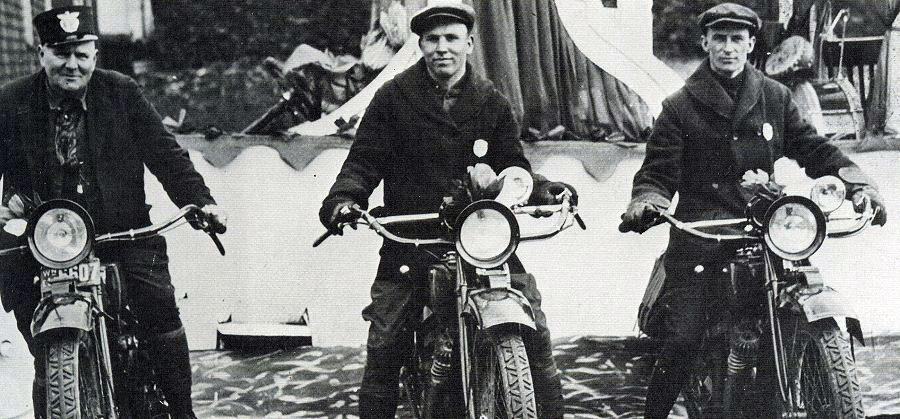
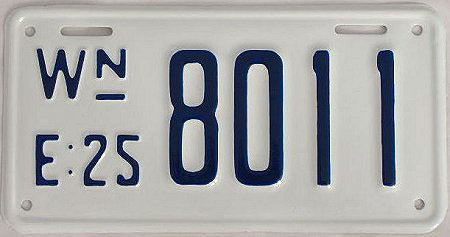 1925 Motorcycle issue. Embossed steel.
1925 Motorcycle issue. Embossed steel.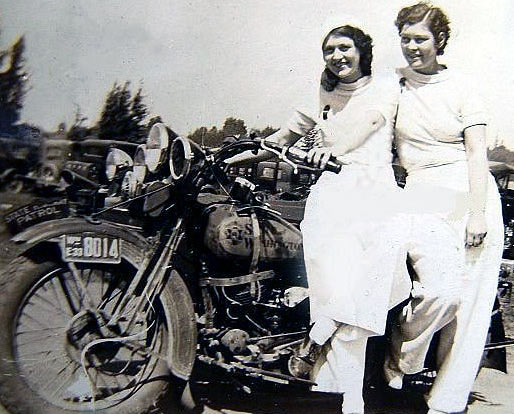
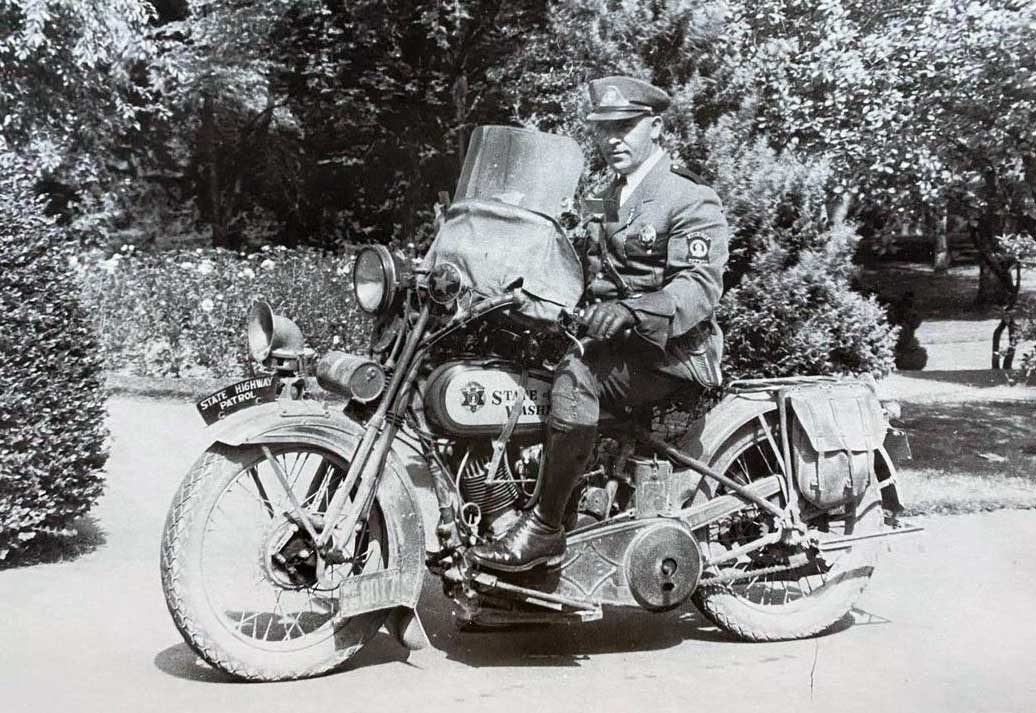
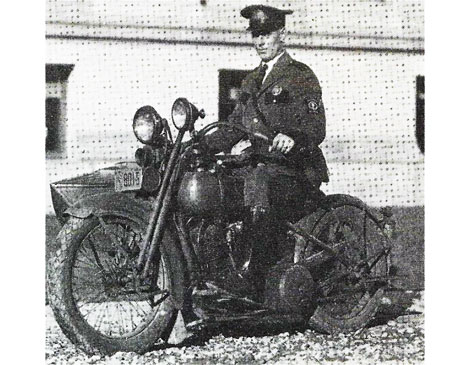
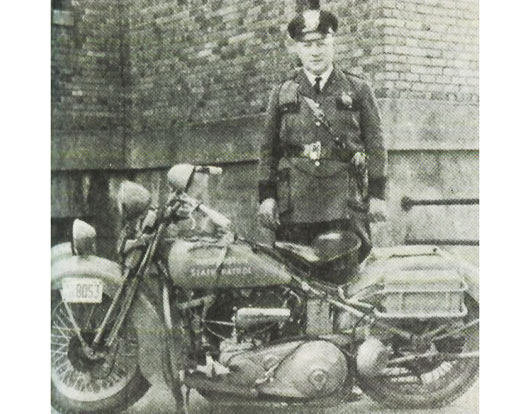
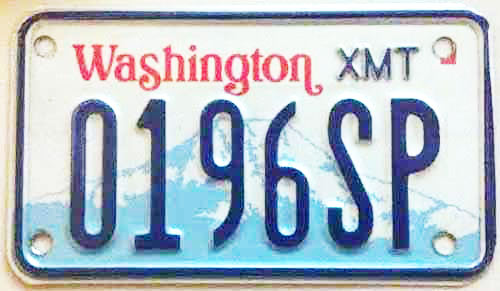 1987-1998 motorcycle issue.
1987-1998 motorcycle issue.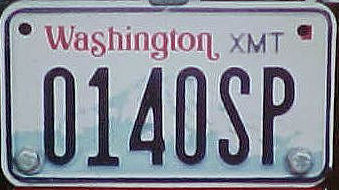 1987-1998 motorcycle issue.
1987-1998 motorcycle issue.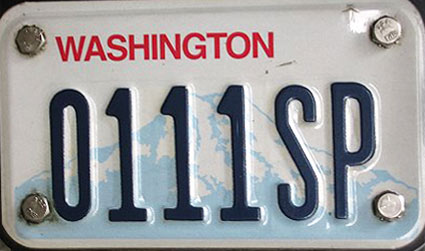 1998-Current motorcycle issue.
1998-Current motorcycle issue.
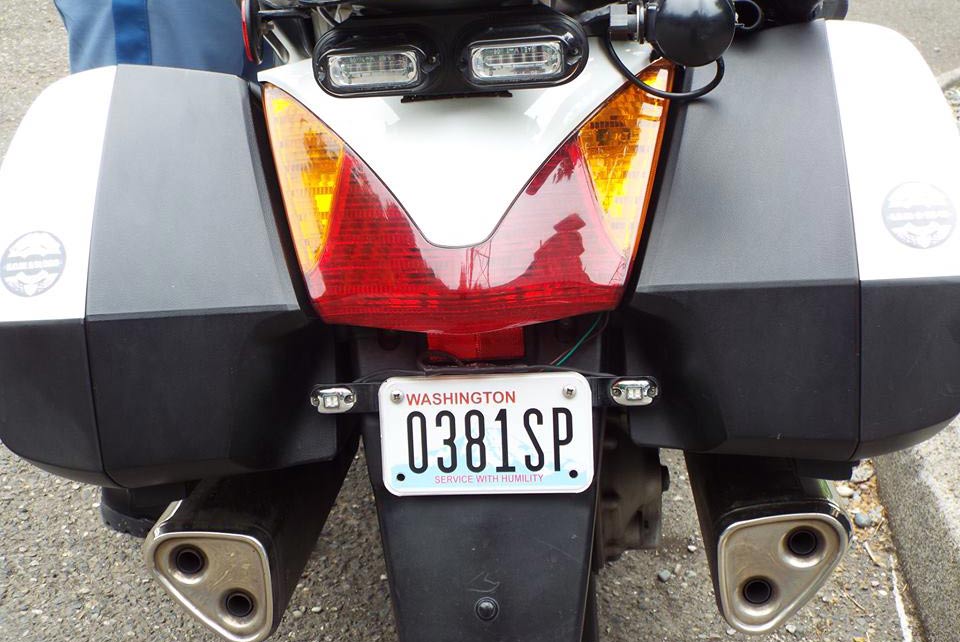 (Courtesy Paul Petrinovich)
(Courtesy Paul Petrinovich)